#askspookies
Note
Hey! sorry to bother you but after your jjk break down i wanted to know what you think about Shoko and her role in the story. I'm just not sure where to put her narratively.
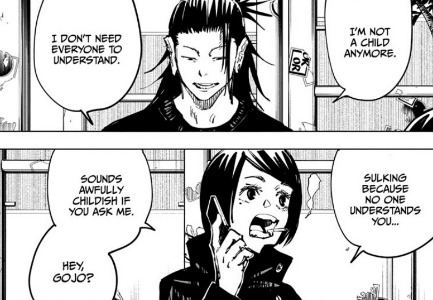
This is going to be a brief answer, but I believe for her limited screen time she still has an important role in the story and it's the same role she plays in the S / S / S trio. Shoko is the adult, as evidenced here by how she's the only one who undercuts Geto's dramatic monologue to point out how childish he's acting. Unlike Gojo who can't get through to Geto whatsoever, Shoko underlines his problem in one sentence. Geto thinks that he's growing up by finding his purpose in deciding to become an extremist, but Shoko calls him out and says he's actually regressing as a person.
Jujutsu Kaisen is a story about children growing into adulthood, and there's a reason that Shoko is the only person in her class to actually reach adulthood. It's because unlike Gojo and Geto who were eternally trapped in their "springtime of youth" and failed to ever adjust to the trauma they experienced in that youth Shoko grew up.
A character who doesn't grow in a story is as good as dead. Gojo had a character arc, but looking back from beginning to end it almost seems like his death against Sukuna was inevitable because he never learned who he was outside of being the strongest, and he never moved past Geto's death in any real way and tried to make connections with other people.
It's something even Shoko of all people was able to see that Gojo wasn't. That for all of Gojo's claims of being alone, not only did he have Shoko by his side all along, but he also has an entire group of students who he was responsible for who were all relying on him. Gojo could have continued living for them instead of going out in a blaze of glory against Sukuna, but he wasn't able to see all the people in his life until it was too late. He kept on being blind to them because he was trapped in the mindset of his youth that he was too powerful to be understood by anyone and then never grew past that.
Shoko is one of the few teachers left alive at Jujutsu High and that's not a coincidence. Nanami's death is deliberately tragic because he was unable to protect people properly as a sorcerer the system was against him. Shoko's not a fighter on the front lines however, she's a doctor who exists sort of outside that system. Yaga was killed by Gakuganji as well. Haibara died an unfortunate victim in his youth. Geto defected because he was unable to grow up, and Gojo goes out dying against Sukuna in a battle to see who's strongest.
The only teachers who are alive are Kusakabe who's a minor character, Utahime who is the only other adult who shows concern for her students, and Mei Mei. I doubt Mei Mei is going to survive either considering she's the game master (this is just my theory but watch I'm correct).
Which leaves Shoko and Utahime who are both adults, and who also have a much more functional friendship that explicitly parallels Geto and Gojo's. There's a reason Gojo's death dream reverts him back to seventeen years old again, because in a way he didn't grow significantly since that time. Nanami, Gojo, Geto they were all unable to leave the regrets of their youth behind so the last we see them in the imaginary afterlife they are seventeen because that's the time they failed to move past.
Shoko grew up. She and Utahime are the only ones who were able to grow up, and because of that they ended up leaving a lot of their friends behind. I think Megumi and Shoko will parallel each other in the end of Gege decides to stick with his plan of three of the four dieand one lives. Megumi the child that needs to grow up, will be the only one of his friends to reach adulthood just like Shoko.
It will be bittersweet because Megumi won't have his friends with him, but unlike Gojo who was trapped in the past forever, life will go on for Megumi and he'll be able to live with all those losses.
144 notes
·
View notes
Text
Who the hell is this?

Halloween plastic skeleton with internet connection
This is an 18+ blog (Going to keep it on the PG-13 side to be cautious tho)
💀✨BUY MY SHIT - Bam Stroker Itchio ✨💀
Writing Commissions OPEN - FAQ/Request Form/Writing Samples Link Here
Other digital haunts:
Bluesky account - bam-stroker.bsky.social
Cohost account - cohost.org/bam-stroker
Ko-Fi - ko-fi.com/bamstroker
Caard: bamstroker.caard
Feel free to send me asks!
If you make art inspired by my writing pleaaaase @ me!!!
Ask tag: #askspooky
Writing
Published Works
If it is spicy I'll tag with: #NSFW or #suggestive
Tag for any snippet shares: #cryptcrumbs
Possible project ideas: #ideasbin
Original Works WIP Masterpost
Will update tags/names etc as stories get closer to being finished.
Fanfic Masterpost
Entirely gay robot shit, for funsies~
Got a monster folk song? Send it my way!
Tags: #monster folk song quest #Monster folk songs
30 notes
·
View notes
Note
was..... Was that toast that popped out of the proto? .... that's adorable
Out it comes!! Ready to eat 🍞
12 notes
·
View notes
Note
With all the recent development in the story and Gege's trend of deconstructing the mindset of those who places value in 'strength' over anything else and their overwhelming sense of self, where do you think is he going with Megumi? Especially with how he's been narratively intertwined with Gojo, Toji and Sukuna, all of which are embodiments of 'with strength comes solitude'.
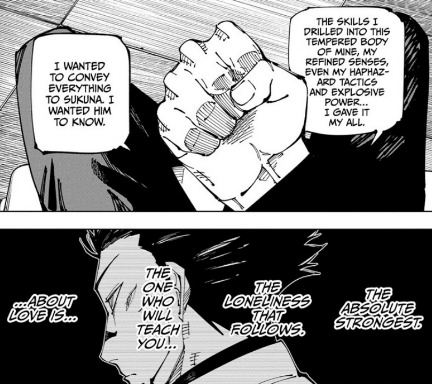
Good question, anon. Gege has been focusing on the mindsets of larger than life characters like Sukuna, Gojo and now Kashimo lately, on people who are so self-centered and egotistical that other people barely register t them as "people." Sukuna imagines them as insects trapped in a spider web's, Gojo calls them plans, Kashimo clods of dirt. They've been getting so much focus as of late some readers are even questioning why we're taking so much time to pity characters like Sukuna for being lonely while he's actively stealing a teenager's body and destroying Megumi's life.
As you said Megumi's connected to this too. All three of these characters, Toji, Gojo and Sukuna are connected to Megumi in some way. His father, his teacher, his violator. They also represent someone Megumi could have been. He could leave sorcerer society like his father and live as a curse user. He could have grown up to unlock the full potential of the ten shadows and surpass Gojo in strength and serve as an even stronger lynchpin to Jujutsu Society. Even Sukuna saw potential in Megumi that Megumi didn't see in himself, hence why he stole his body.
They also all made the opposite choice that Megumi made. Megumi is selfish yes, he even admits so, but he values his connections with people over being strong, his job as a sorcerer, or even himself. While the characters we're talking about made the choice to value strength over everything.
Oddly enough though, Megumi has been punished so far for valuing other people while people like Sukuna keep getting what they want. Why is this? Is the manga advocating for Sukuna's point of view? Is it telling us to sympathize with him?
Twitter user @ det_critics has a good thread [x] on Sukuna's narrative role in thestory, and how the world itself seems to support him because Sukuna keeps winning unhindered continued here too [x].

It is a great thread, and it definitely is a trend that characters with strong egos and self-centered goals tend to achieve what they set out to achieve in the manga. Just to compare quickly with other characters before we dive into Sukuna.
Yuji who's goal is to help others achieve a natural death, fails consistently at every turn. Fails to help Junpei. Fails in his goal to let himself be executed to reduce the total number of deaths in the world by letting Sukuna out at Shibuya. When the option to let Angel kill him come up so she can execute sukuna and then release Gojo as a promise, he ends up letting Sukuna escape and take Megumi's body. In fact, Yuji not counting "himself" as a person that Sukuna wasn't allowed to harm in his binding vow is what allowed Sukuna to accomplish this.
Megumi who's goal is straightforward, stop Yuji's execution and find a way to fix Tsumiki's curse. When he tries to find a safe way for Tsumiki to escape the culling games he is blindisded by the fact that Tsumiki was possessed by Yorozu and he didn't notice which meant there was no saving her from the beginning, and he's also immediately taken over by Sukuna after the fact. Sukuna kills Tsumiki shortly afterwards and will proceed to do the same to his friends.
Kokichi who only wants to rejoin his friends with a healthy body, is butchered by Mahito in the forest unable to meet up with the others and warn them in time about Shibuya. While he had selfish reasons for making a deal, he was also in a way trying to protect them behind their bacs.
Miwa who is only a sorcerer to get money for her family, doesn't put in her 100% and isn't strong enough to be someone who Kokichi trusts, so he lies to her face and by the time she realizes the truth she's helpless to do anything to save him from his fate and he's already dead.
Mai who's goal is to be reunited with her sister also doesn't put her all into training as a sorcerer, and because of that she's unable to help Maki get out of the pity when they're both inside it, and the only way to escape that situation for her is to sacrifice her life to give Maki power.
All of these characters who either have selfless goals, or their actions are oriented around other people rather than themselves are relentlessly punished by the plot. It's like Gege is Gojo, chastising Megumi for making a sacrifice bunt instead of swinging for the fences.
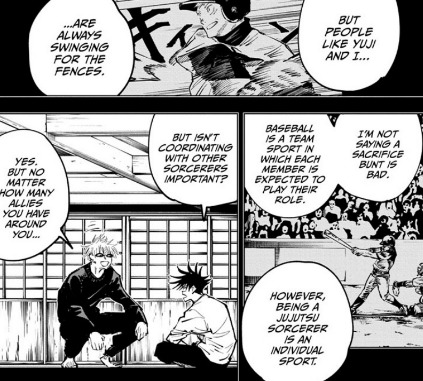
If there are clear plot consequences for every time a character has selfless goals, while characters like Sukuna seem to only ever be rewarded then is the author agreeing with Sukuna? Sukuna whose whole philosophy is just "burn everything to the ground and do whatever you want."
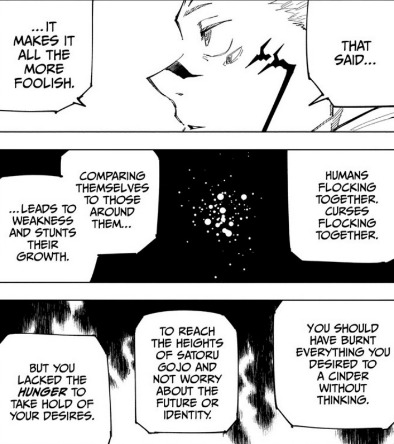
Remember, there's another character who espoused a similiar philosophy before. A character who Yuji aligned with Sukuna as being "a true curse."
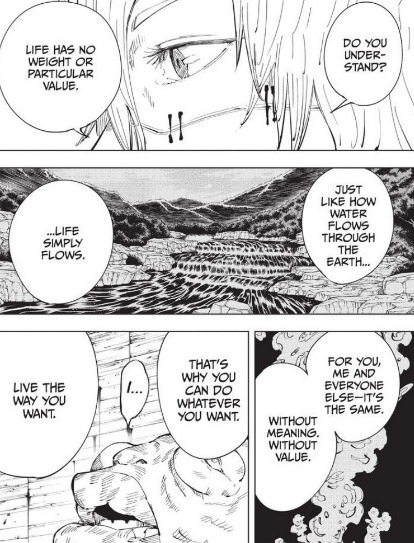
Don't limit yourself to just being indifferent. There's no reason to live by such a resitrcting philosophy. If you're hungry, eat. If you hate, kill. I support everything you represent, Junpei...
It's right of the strong. "All inequality in this world come down to the competetence of the individual" as Tokyo Ghoul would put it.
The strong can do whatever they like with their strength, unless someone strong enough to physically stop them comes along. It sounds simple, but Sukuna and Mahito are so poetic they make it sound like pseudo-enlightenment.
This is just me, but I don't think Gege is writing this manga with the message that "If you're strong then you should be able to do whatever you want." If only because that is a little too simple and so far Jujutsu Kaisen is a manga where no character is ever one hundred percent correct, or one hundred percent wrong in their viewpoint. To make one character right above all others strikes me against the trend of the manga thus far towards more balanced look at its characters philosophies.
Rather, I think the world so far favors Sukuna's point of view for two reasons, one Jujutsu Society is a society designed to exploit people for the favor of a few people on top. Therefore people who look out for others like Nanami dying as a cog in that society, as one of the people that society is designed to exploit, whereas people like Mei Mei who are focused on crawling to the top and being the exploiters rather than someone who is exploited benefits... well then, that's showing what Jujutsu Society is like. It's not agreeing with it. It's showing the inherent unfairness of the world and a society designed to exploit and victimized people like Mai, Kokichi and
The second is that by siding with Sukuna so much, the story shows how tempting it is to think like Sukuna. To take before your taken from, to always be the victimizer and never be the victim. The story does invite you to feel sympathy to Sukuna for an extent, but it's sympathy for the devil.
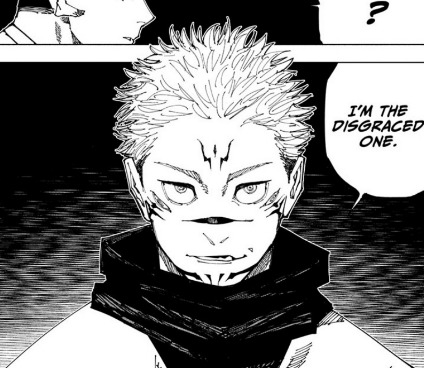
Sukuna's known as the "disgraced / fallen one" and he's being hunted by a clear analogue for a christian angel who claims to be following the beliefs of their god. Gege is likely, taking a miltonian angle with Sukuna.
Paradise Lost is an epic poem written by John Milton depicting Lucifer's fall from heaven, and then his actions in tempting Eve to eat the apple in the garden causing the fall of mankind. It's well known for making Lucifer into its protagonist despite him being the antagonist of you know... christian theology, with most of the story depicting the fall from his point of view.
One of it's most famous quotes takes place right after the fall, where Lucifer has been kicked out of heaven and he tells everyone he's totally cool with this fact. Really guys, it's great here in hell.
The mind is its own place, and in itself Can make a heav’n of hell, a hell of heav’n.
What matter where, if I be still the same, And what I should be, all but less than he Whom thunder hath made greater?
Here at least We shall be free: th’Almighty hath not built
Here for his envy, will not drive us hence: Here we may reign secure, and in my choice
To reign is worth ambition, though in hell; Better to reign in hell than serve in heav’n.
Satan justifies his disobedience because he may be cast out of heaven as punishment, but at least he's king here. It's a little bit like Sukuna's dilemna. Sukuna's philosophy is strength at the cost of everything else, you should burn everything in sight and only care about yourself. The flip side of that is that Sukuna's left all alone standing in a wasteland. He's king where he is, but he's king of absolutely nothing.
Sandman by Neil Gaiman already came up with the perfect counter to Lucifer's "Better to reign in hell"

Who in hell, doesn't dream of heaven?
Anyway, John Milton's epic is often accused of having too much sympathy for the devil, but that's actually the point. Lucifer is the narrator and he wants you to sympathize with him. He's trying to paint himself as a brooding anti-hero, who's suffering in hell because he's in the right. He's painting himself as the hero and the victim. It's about the tempting nature of sin itself.
Lucifer's not the villain of the story because he does bad things or sins however, but because he does bad things and refuses to self reflect and change on them.
In essence, Paradise Lost presents two moral paths that one can take after disobedience: the downward spiral of increasing sin and degradation, represented by Satan, and the road to redemption, represented by Adam and Eve.
While Adam and Eve are the first humans to disobey God, Satan is the first of all God’s creation to disobey. His decision to rebel comes only from himself—he was not persuaded or provoked by others. Also, his decision to continue to disobey God after his fall into Hell ensures that God will not forgive him. Adam and Eve, on the other hand, decide to repent for their sins and seek forgiveness. Unlike Satan, Adam and Eve understand that their disobedience to God will be corrected through generations of toil on Earth.
The theme of Paradise Lost is that any sinner, even Lucifer, can stop at any time and seek forgiveness instead. However, Lucifer chooses not to do that. He could leave hell at any time but he chooses to stay. He's fine in hell after all. He's totally gotten used to the temperature by now. Everything is fine Lucifer says, while everything is on fire.
Lucifer would rather stay in a hell of his own creation because it gives him the illusion of control over his life then admit he was wrong or give up that control. Even though as I said before the king of hell is still in... hell. He may be the king there but he's stuck in hell along with everyone else.
You could also connect this briefly with the budhist idea of impermanence, and the idea unhappiness is inherent to life. Sukuna and Kenjaku are both immortals who've persisted for more than a thousand years, but if from a budhist perspective life on this shithole rock is inherently unhappy for everyone then they're still stuck on this shit hole with everyone else. Neither of them are satisfied with their lives either, despite being seflish people who can take from others and get whatever they want out of life. Which once again, Budhist themes would say that anyone stuck in the cycle of reincarnation will live a life riddled with unhappiness and the only way to truly escape is to break free from the cycle, something neither Kenjaku and Sukuna will every achieve because they're postponing they're lives indefinitely.
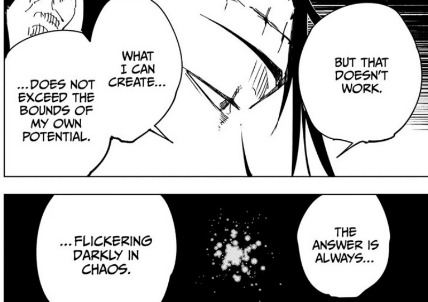
Kenjaku's lived for a thousand years but he's bored. Nothing ever surprises him. Nothing ever happens beyond his expectations. He's constantly manipulating others to get what he wants, but he can't even vocalize what he wants.
To illustrate this concept further let's use a character from another anime who is a luciferian archetype. In Revolutionary Girl Utena there is a character named Akio, who used to be the prince Dios. A sort of deity who was once able to save every princess in the world. He was overwhelmed by the number of people demanding for his help and his sister sealed his power away in order to save his life before he worked himself to death.
Now he's reinarcnated as a mortal Akio Ohtori, who rules over Ohtori Academy, a place where children never grow up, where time doesn't seem to pass, a place that may just be purgatory. He's the chairman of the academy who also uses his power and infleunce to control the students, and manipulate them into joining a dueling tournament where they fight over his sister the rose bride, in order to try to find a student strong enough to try to unseal his old power.
WIthin the halls of Ohtori Academy Akio can do whatever he wants, he can sleep with whoever he wants, he's got this really cool car guys and he jumps on the hood and sits like this.
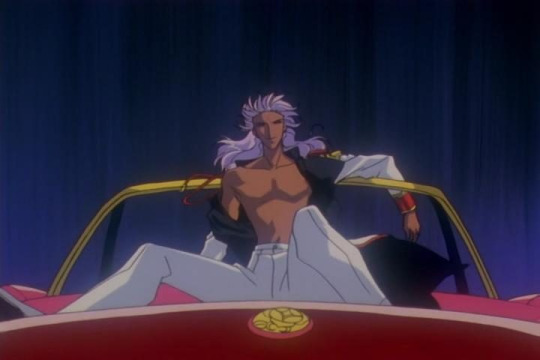
However, Akio may be king there but he's trapped as much as everyone else. Since Utena is about deconstructing toxic masculinity, every lie about Akio that he's powerful, that he's in control, that he's someone special is shown to be false. He's in control yeah, but that's because he's an adult manipulating teenagers. He's a teenagers idea of masculinity, which is just having a cool car, being super attractive and sleeping with wo you want. He's just an empty person, who only has power because he actively takes it away from others. The ending line of the series is his biggest victim just walking away from him, proving how powerless he is.
Akio: I've got to rebuild the Code of the Rose Signet from scratch.
Akio: I'm counting on you, Anthy.
Anthy: You don't know what happened, do you?
Akio: What?
Anthy: It's alright now. Please go on playing make-believe "Prince" in this comfortable little coffin forever.
Anthy: But I must go.
Akio: Go? To where?
Anthy: That person hasn't vanished. She's merely left your world.
Akio: What're you talking about?
Akio: W-wait a minute! Anthy!
Akio: Anthy!!
Anthy: Farewell.
Ohtori is a coffin and Akio is trapped there the same as everyone else. Akio isn't a prince or a god, he's a corpse. He's willingly choosing to stay in hell rather than go anywhere better because that meant giving up power and control.
Doesn't that sound familiar? Kenjaku may get a lot of victories in the story, but all of his power comes from taking, manipulating, he is like Akio in the end a rapist who gets power from using and abusing others.
Literally, in both Kenjaku and Sukuna's cases because their current powers are stolen from the bodies they stole as well. As annoying as the Fraudkuna memes are theydo somewhat have a point, that Sukuna gained power from violating and taking the body of a sixteen year old boy. Without said sixteen year old boy he wouldn't even have a body to move around in because he's long dead.
They have taken, stolen, and robbed to get wat they want but arguably they are just as trapped as the main characters. Kenjaku and Sukuna get constant victories over the main characters yes, but do they get what they want? Kenjaku is still bored and he's always disappointed with how his plans turn out. As for Sukuna I have a hard time vocalizing what he wants. He lives to fill his apettite but he's always hungry. He lives to fight strong opponents, but he's number one the strongest that means there's no challenge, and number two he'll cheat, to win when he's in a corner so he deprives himself of the satisfaction that say Gojo won when he lost to a stronger opponent after giving it his absolute all.
Sukuna and Toji and Kenjaku and really whoever's philsophy of take before you're taken from and right of the strong only works as long as they are the strong ones. Mahito follows his philosophy of if you're hungry eat, and if you hate kill and it works for him right until someone stronger comes along.
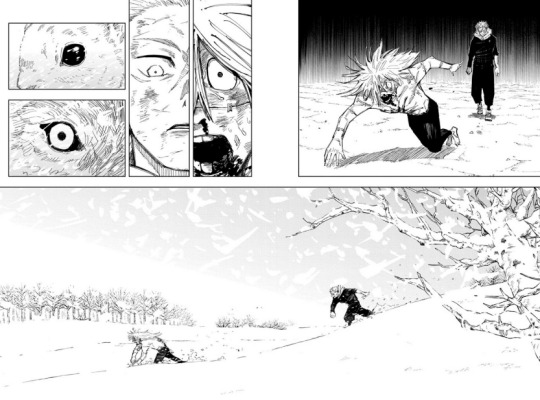
That philosophy only works for you when you're the strnogest. If you show no mercy to those beneath you, then once you're no longer on top why would anyone show mercy to you? Mahito is suddenly no longer the wolf he thought he was, when he's the rabbit he acts just as frightened as all of is victims did.
The thing with all of these characters Gojo, Toji.. The second someone stronger appears they're reduced back into being human. Toji has a hole blown in him, Gojo is cut in half, they even die the same way they both die standing up. They both follow right of the strong, and kill or be killed until it's logical endpoint. They die when they're no longer the strongest.
I can go on about Toji's life and how while characters like Maki and even Gojo hold him up as some kind of paragon because he is strong, he's someone utlimately pathetic. He's so strong, but he shoots a sixteen year old girl in the head. Sixteen year old schoolgrils aren't even that strong dude. Toji is strong enough to ill any sorcerer that's not Gojo, but all the money he makes he gambles away. He jumps form women to women. He just drifts through life unable to grow up or cope with the trauma of his youth in any real way. The one thing he does care about in his life is Megumi, and his connection to Megumi is his dying thought for both of his deaths. He's strong enough to do whatever he wants, but clearly the one thing he did genuienly care about wasn't strength but Megumi considering he stabs himself in the brain rather than continue to fight Megumi once he realizes who it is. It's something that stops Toji who was apparently on a rampage as a puppet of carnage.
Toji, Gojo and Sukuna are all characters who represent who Megumi could be. They even push Megumi into thinking more like they do. Megumi believes his father didn't care about him and he's off living it up somewhere. Toji has modeled to Megumi he should dodge his responsibilities towards the ones he love and only live for himself.
Gojo has pushed Megumi into being a sorcerer with the intention of cultivating a sorcerer that's just asstrong as he is. Not all of his advice is bad "It's okay to be seflish" isn't bad advice, but he's also trying to make Megumi into a mini-Gojo. He wants to push Megumi into someone who can use the ten shadows to surpass a limitless user into taking consideration with what he wants.
Sukuna also pushed Megumi to fulfill his full potential, but that time too he had the selfish intention of you know... taking Megumi's body for himself.
Even Reggie tells Megumi he should learn to fight like a true sorcerer, and true sorcerers are con men. Megumi himself is tempted to act like them at times too. He kills a man while he's already down in cold blood, and then justifies it that it's for Tsumiki's sake when it's really just a power play. He almost mauls the girl with the scorpion hair because he finds her personality to be disgusting, once again lashing out with violence and power.

Megumi has been pushed to act this way, and Megumi himself sometimes embraces his power and uses it like this. To the point where now Megumi has been possessed by someone who is his anti-thesis, if Megumi wishes to use his power for the sake of his loved ones in his life Sukuna has no loved ones and only uses his power for himself.
In Paradise Lost, Lucifer corrupts Adam and Eve so they'll be dragged away from paradise just like him. Sukuna makes Yuji feel complicit in his massacre in Shibuya, and wants to make Megumi feel guilty for Tsumiki's murder. He also makes a point of pushing Megumi from early on to live out to his full potential.
Is Gege endorsing Sukuna's way of thinking, or is he merely showing the audience how tempting it is to think that way?
Yes, so far Sukuna has gotten away with everything while the protagonists struggle, but so did Mahito. So did Toji.
Everything he did against the protagonists in Hidden Iventory went exactly according to plan because they were worrying about protecting someone else and he only cared about wearing them down, looking for a weakness, and protecting himself until Gojo dropped his guard. Everything worked out for him until someone stronger came along.
Why would Sukuna be the exception to this rule? The entire philosophy that Sukuna builds his life around says that if he loses, than he'll be eaten too. Since he's prolonged his life for one thousand years by cheating and taking from others why exactly would he be any more satisfied with his death then Gojo or Toji was?
Is Sukuna really winning? Is he a corpse like Akio? Is he in hell like Lucifer? He's gotten everything he wanted out of life by taking from others but is he really satisfied?
Megumi may be tempted to walk the same path that they did, but I believe in the end just like Toji was saved by is connection to Megumi in his last moments we'll see Megumi be saved from Sukuna's grasp by the one thing that Sukuna doesn't have. A connection to another person, based upon love instead of power.
Because, hey, it worked for Yuta.
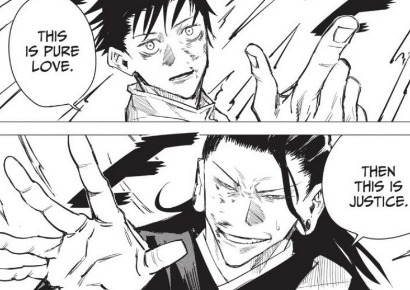
131 notes
·
View notes
Note
I am know this is an insanity broad question but do you have any specific thoughts on Revolutionary Girl Utena? or anything that you think hasn’t been said or just caught your attention? Your one of my favorite meta writers and I’ve been reading your blog since you were doing semi-regular AOT meta, so I guess I should have figured you had seen the series—RGU is a show so dense symbolism, metaphor, ect.—there was just so much to pick apart. Anyway, I would love to hear anything you had to say abt the series!

Sure, I've always wanted to do a meta on the Black Rose arc which is a totally underrated arc. I feel part of the reason it's not as discussed as other arcs is from a lack of understanding of it's role in the story.
The Black Rose arc is a moon arc.
You've heard of the hero's journey, now it's time to learn about the fool's journey. In Tarot, The Fool's Journey is a journey to self fulfillment where each of the 22 major arcana represent a stage on that journey - an experience that a person must incorporate to become whole.
The fool begins their journey at (0), fresh as a newborn, naive and unaware to the world. The fool is strangely empty, as is zero. Who better to serve as our analogue for the fool then the main character Utena Tenjou, characterized by 1) her naivete and 2) her emptiness.
Several years after losing her parents she lost the will to keep on living. Desperately in search for a reason to live a prince appeared before her and gave her one, showing her something eternal, and leaving with her a ring to lead her to him one day. That was all very well and good, but so impressed was she by the prince, that the princess made up her mind to become a prince herself!
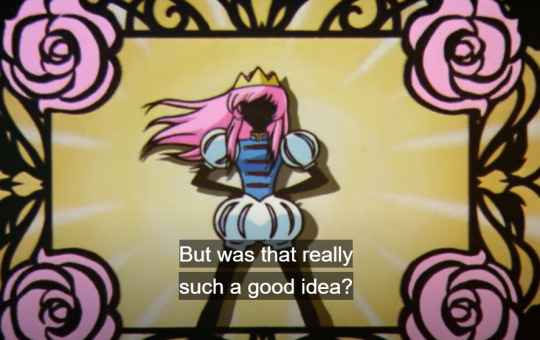
Or so the story goes.
Utena is blindly striding forward (and right off a cliff) like the fool card, and also like the fool she's on a journey to fill her emptiness and become whole. At the start of the story she's not a complete person. She's 14 to begin with, but also look at how she reacts when Anthy is stripped away from her at the end of the first arc and the "purpose" given to her is gone. She becomes depressed and barely responsive, and only stands up again to get that purpose back but she's still clinging onto someone else for purpose. Utena is like the fool, on a journey to become a complete person by gaining knowledge of the world.
That is what I would say separates the Hero's Journey from the Fool's Journey, the Fool's Journey is a Jungian narrative in nature. It's not about battling obstacles like in the Hero's Journey, but about the process of individuation. Individuation is the process by which an immature and fragmented psyche, and the experiences of a person's life, become integrated into a well-functioning whole. You can integrate your past memories, your shadow in a jungian sense, your subconscious, into a well-functioning whole.
Utena is not whole however by the time the Black Rose arc comes around, and her lack of awareness of this fact and of her own shadow is exactly what allows it to overtake her.
So we're following Jung here. Jung, Jung, Jung.
Jung and Tarot go hand in hand because Jung believed in archetypes, sets of symbols that were universal across all cultures, that appeared in both dreams and mythologies and were deeply meaningful to us on a subconscious level. The idea of prince and princesses in Utena are a Jungian Archetype. The Moon card Tarot also has major associations with Jung's idea of the subconscious.

PIctured is the full moon int he ngiht sky, positioned between two large towers. The moon is the symbol of dreams and the unconscious,it's light is dim comapred to the sun and only slightly illuminates the path to higher consciousness leading between the two towers.
In the foreground is a small pool, representing the watery, subconscious mind. A small crayfish crawls out of the pool, symbolizing the early stages of unconsciousness unfolding. A dog and wolf stand in a grassy field both howling at the moon, representing both the tamed and wild aspects of our mind.
The moon is a card heavily tied to Jung's idea of the subconscious, or the shadow. If the persona is our outer face to the world, what “what oneself as well as others thinks one is” [CW9 para 221], the “shadow is that hidden, repressed, for the most part inferior and guilt-laden personality whose ultimate ramifications reach back into the realm of our animal ancestors…If it has been believed hitherto that the human shadow was the source of evil, it can now be ascertained on closer investigation that the unconscious man, that is his shadow does not consist only of morally reprehensible tendencies, but also displays a number of good qualities, such as normal instincts, appropriate reactions, realistic insights, creative impulses etc “ [CW9 paras 422 & 423].
Jung believed in a separated consciousness, the conscious mind is the persona the light we can see and the shadow is the subconscious mind which consists of all that we are unaware of and/or is hiding in the dark, quite literally the shadow of our conscious minds.
In Fool's Journey the Moon Card is the stage at which the light is so dim that our shadows become the longest. When I say a Moon Arc in any kind of story, I mean a story arc where characters are essentially caught in the Moon Phase of the fool's journey, which is a special time of confusion and illusion.
Essentially, the Star which is the card preceeding it is the card of temporary inspiration. The star's light is what makes the fool vulnerable to the moon's illusions.
The light that illuminates this for him is The Star (17) which provides hope and a sense of renewal; this is the light at the end of the tunnel. The Fool feels inspired to start shining as his true self. However, its opposite – The Moon (18) – represents any fears and subconscious programming that may prevent him from enjoying this new state of bliss. Light casts a shadow and the shadow, in this case, is the old anxiety and fears which may rise to the surface when attempting to shine brightly as The Star.
The light of the star makes the fool vulnerable to the illusions of the moon. His positive emotions aren't subject to mental clarity. In his dreamy condition, the Fool is susceptible to fantasy, distortion and a false picture of truth.
So that is the moon arc in a nut-shell, an arc where a character gets too close to the light only to be trapped in shadows. How else can you describe the confusing Black Rose Arc but the characters themselves being trapped within a mage of illusions? Much like a dream the characters are trapped in, there's no sense of direction, time flows strangely, and the events of the entire arc are forgotten by the time the characters wake up.
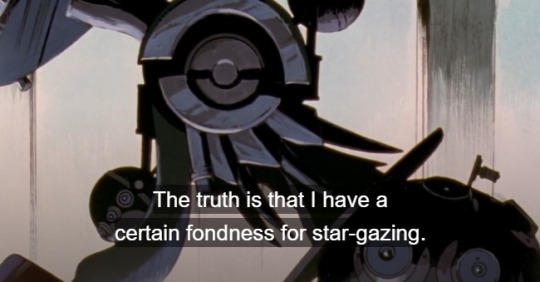
I'm not making up this Tarot symbolism either, in the first episode of the Black Rose Arc we are introduced to Akio, Anthy's older brother who likes to gaze up at stars in an indoor planetarium. A figure who gives advice to Utena all throughout the arc, but who is also clearly hiding another agenda and misleading her on purpose. The light of the stars leads to the illusions of the moon. He even discusses the moon with Utena in Episode 15.
Utena: Akio-san, you really think about your sister a lot, don't you?
Akio: Do I?
Utena: I probably wouldn't understand since I don't have any siblings myself,
Utena: ...but what does it mean for a girl to have an older brother?
Utena: What's this?
Utena: The moon?
Akio: Normally, it's something useless and of little concern.
Akio: But, every now and then, you look up at it and feel a certain degree of comfort
In this context he uses the moon as a metaphor for a sibling, someone who's always there but you don't usually notice them, but those words could describe the subconscious mind as well. Also, one final instance of star / moon symbolism within this arc the stars made by Akio's projector are fakes. The stars themselves are illusions.

The Back Rose Arc follows a formula to a T. Every episode a duelist comes to the Mikage Seminar for help (which is specifically a therapy seminar more Jung symbolism right there), they begin talking about their problems as an elevator descends down an elevator shaft and the voice listening urges them to go deeper.
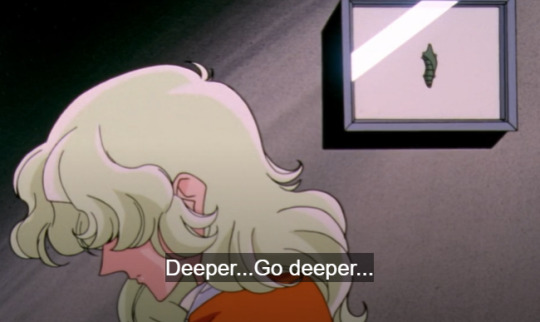
Utena later rides an elevator up to the dueling arena too, because the elevators are symbols for traveling to different areas of consciousness. The three levels, the dueling arena at the highest, the academy on the ground floor and the bottom of the elevator shaft era a metaphor for Freud's iceberg theory of consciusness which similarly divides the human mind into three levels.
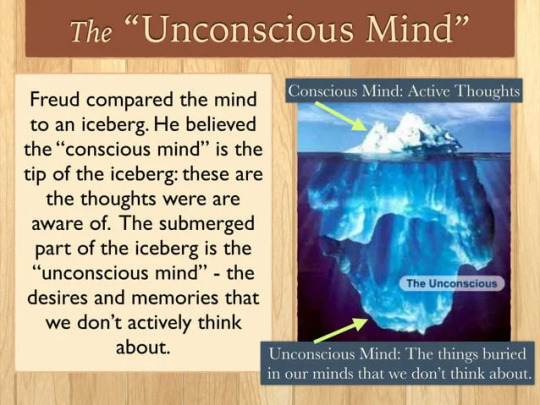
Not only are the characters physically descending down an elevator shaft, they are also plumbing the depths of their own unconscious minds and revealing to themselves what they have intenionally kept hidden and repressed by trying to bury it that deep.
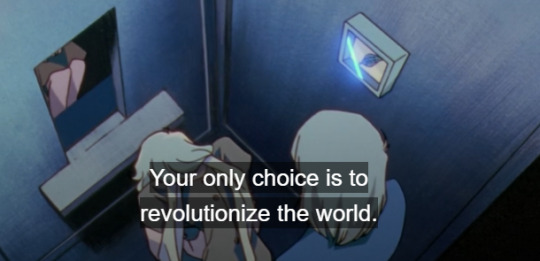
On the wall there's a specimen of a butterfly that slowly reverses its metamorphosis, from a butterfly, to chrysallis, to caterpillar, and then to a leaf with eggs on it. This too is a symbol of the unconscious, but this time of Jung, because Jung believed the unconscious mind was made up of our most primal instincts. The butterfly regresses to its infantile state while the characters in the elevator regress with it.
These characters become shadow possessed. In the story quite literally possessed as Mikage uses a black rose to turn them into duelist. However, Jung theorized that traits in our lives we repress or refuse to acknowledge are still there, they just come out in other ways.
“That which we do not bring to consciousness appears in our lives as fate.” (Carl Jung)
In the Curios Case of Dr. Jekyll and Mr. Hyde the good doctor Jekyll is a philantrophist who has lived a good life, but makes a potion to bring out his worst traits and transform himself into a hideous monster, so he can commit barbarous acts and get away with it. He just needs to drink the potion again and return to being Jekyll and all of his cruel acts will be blamed on Mr. Hyde. Over the course of the story the potion stops working and Jekyll can no longer drink a poition to neatly divide between his philanthropic good side, and his ugly bad side which robs and murders. He becomes Mr. Hyde all the time, his shadow gains dominance over him making him shadow possessed.
"With every day, and from both sides of my intelligence, the moral and the intellectual, I thus drew steadily nearer to that truth, by whose partial discovery I have been doomed to such a dreadful shipwreck: that man is not truly one, but truly two.” - Robert Louis Stevenson
Not only are the Black Rose Duelists possessed by their own shadows, the repressed qualities that are brought out in the Mikage Seminar's evil therapy session but they themselves also serve as shadows figuratively in story to the duelists they steal the sword from.
Kozue is the fixation of her brother the chaste and knightly Miki's madonna-whore complex, while Miki appears to be the most harmless of the boys he has an obsession with purity especially in his childhood days that he projects onto his sister and also any woman resembling his sister like Kozue.
Juri is the calm, cool, and collected female of the student council. Immediately seems like the most decent student council member. Just as looked up to by all the female students as Utena is. Until you find out she's a lovesick puppy reduced to a total emotional wreck over her unrequited love, unable to do little more than pine over her in secret. Then you meet the person she's in love with and her fixation on her friend Shiori just makes her look even more desperate.
Nanami is desperately attempting to stand in for her brother as the student council president, yet another one of the many ways she tries to earn his affection as his little sister. Nanami's desperately trying to recreate the closeness her and Toga had as children, but Toga's already left her behind for the world of adults, so now she's stuck trying to prove she can join him there when she's not even close as an incredibly high strung and spazzy thirteen year old who's more naive then even the younger student council members. She also has a kid tagalong who is three years younger than her, the same age gap between Nanami and her brother, who's also desperate to enter the same age group as her and be her equal but for the most part just gets treated like a pet or toy.
Kozue takes the sword from Miki, because Miki's issues revolve around his relationship with his sister which is a constant problem that plagues him in his life but something he chooses to ignore rather than address and fix.
Shiori takes the sword from Juri because she too is a shadow archetype, the object of Juri's affection but someone she doesn't talk to, or attempt to mend their relationship, and she especially doesn't seem to understand the real Shiori to the point where you wonder why Juri is so hung up on this person in particular. Is she even hung up on the real Shiori or is it just a fantasy because the real one falls far short of the romantic ideal that has Juri wandering the gardens at night and composing poetry like she's Lord Byron.
Mitsuru takes the sword from Nanami, because Nanami can't see the fact that the way she's treated by her brother, is ultiamtely the way she treats Mitsuru. No matter what Nanami does or how hard she tries to earn it, nothings going to close the gap between her and her brother and she can't force it the same way Mitsuru can't magically become thirteen.
Toga's is the hardest to fit into this category because he's not really around this arc and Keiko isn't much of a character, but it's interesting nonetheless one of Toga's many groupies is convinced of this cinderella like fantasy that Toga's evil sister is getting in the way of her true love with Toga and only if Nanami were out of the way Toga would be hers and hers alone. Just completely unaware of the way Toga treats women and just who Toga is in general. .
It could be a shadow archetype in two senses, one just the bright image of the prince has caused everyone even Toga himself to not notice who Toga really is as a person. They're too caught up in the romantic fantasy of Toga. Or maybe since Keiko taking the sword from Toga practically looks like she's assaulting him in a hospital bed, it could be showing the darker side of the way Toga views sexuality, that it's not necessary something he even likes or wants and has harmful connotations with him. Two it could just be another shadow archetpye for Nanami, there's really no becoming Toga's special girl. Toga's not really going to treat you any differently from everyone else, because he is for reasons completely emotionally unavailable.
Oh, while editing this post I realized I skipped Wakaba and Saionji. Very quickly Wakaba's relationship with Utena mirrors Saionji's with Toga, and Saionji similiarly wants to be someone important / a main character / special like Toga is because he believes it's the only way they can be equals. Wakaba's inferiority complex similiarly drives a wedge in the friendship between her and Utena. Wakaba also kind of uses Saionji as a rose bride of source to validate her feelings and make her feel special when he's relying on her for a place to sleep, whereas Saionji really only seems to want possession of Anthy and the Rose Bride to get one over on Toga so he won't have it.
Not only are the black rose duelists shadow possessed people, but the student council duelists have their swords stolen (symbols of agnecy, power, etc) by their shadow archetypes within the story. Other characters in the story who embody their repressed issues.
They confront their Mr. Hydes and then lose to them. They are temporarily made aware of the moons in their lives, which as Akio describes is someone normally useless of little concern but is always there nonetheless. He was using that to describe himself and Anthy, and by association Miki and Kozue but it applies to almost every duelist / black rose duelist pair, someone who is usually there but they take for granted, or ignore, or in Juri's case just don't want to confront. The Black Rose Arc forces a confrontation for each character with both their shadow, and their shadow archetype.
I could go list the similarities and differences with each set of character but I don't want to go on forever, so maybe in a post for another time. Instead I'm going to focus on the main one at the end of the arc and precisely why this arc is so important Nemuro Mikage, the shadow archetype to Utena.
In all mythologies there appears a trickster, a character which challenges the current ruling authority.
From mythology it is the character of the Trickster “…a collective shadow figure, a summation of all the inferior traits of character in individuals” [CW9 para 484], whom Jung thought could save us from ‘hubris’ and free the conscious mind from its fascination with evil. The trickster is usually thought of as atrocious, unconscious and unrelated, but someone who can nonetheless transform the meaningless into the meaningful. Often encountered at cross-roads, s/he is always moving, duplicitous, sexually rampant and a joker. The trickster is best portrayed, perhaps, by the figure of Hermes, who gave Pandora (‘the all-gifted one’) audacity and cunning.
From the shadows, and quite literally from nowhere appears Nemuro Mikage, a character who believes he can take the power of miracles for himself and also replace the Rose Bride by killing the original and making his partner Mamiya into the new Rose Bride. Can he even do that? How does that work? Who knows, this is Utena we don't explain anything.
The important part is Mikage is the manipulator who challenges the rules at Ohtori, and the established order attempting to subvert things. That's what Utena hates him the most for, being a person who willingly manipulated people who came to him with their issues, twisting them into thorny black roses to lash out at Anthy, and therefore Utena as well. Not only is Mikage made up of inferior character traits he's also an evil therapist who makes you act out on your worst impulses by bringing your worst insecurities to light.
Mikage's not just serving as the temporary trickster archetype however, he's also a shadow archetype of Utena made up of all of her inferior character traits. His name literally means "One's true nature"
根/Ne: lit. 3. “root (of all evil, etc), source, origin, cause, basis” or lit. 4. “one’s true nature” 室/Muro: lit. 1. “greenhouse, icehouse, cellar”.
Nemuro, like Utena is a duelist attempting to seize the rose bride and the power of miracles / eternity / the shining thing for the sake of someone else rather than themselves. They do so because saving Anthy / saving Mamiya gives them purpose.

Nemuro, like Utena is someone who doesn't have friends or family or any connection to the world but suddenly becomes involved in another family consisting of a brother and a sister. He becomes obsessed with the idea of them as a family of three because it fixes the lack of love or connection to other people that is missing in their lives.
Utena becomes obsessed with the idea of playing house with Anthy and Akio, to the point where she completely ignores the true nature of Akio and Anthy's relationship and misses very obvious warning signs. She sees them as a trio especially after moving in with them the next arc. Utena even urges Akio to get in the picture he's taking to commemorate her and Anthy's friendship.
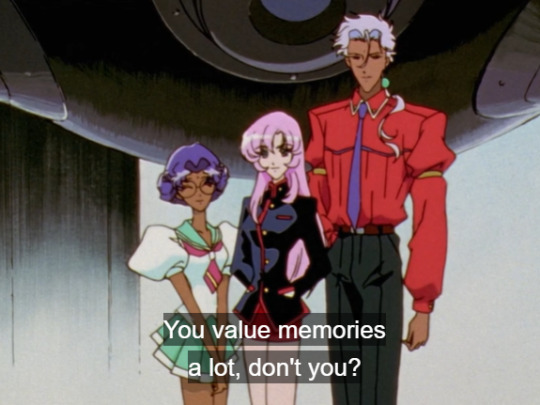
Nemuro also believes he is in love with the older sister, an adult (Nemuro is a child, a child genius but a child nonetheless) but also experiences queer subtext with the younger brother. Nemuro fawns over Tokiko like she is some lost love and makes her the central figure of her motivations, but it's Mamiya he hallucinates actively as being his companion and flirts with when it's Anthy pretending to be him.
Utena is obsessed with a prince from her past driving her actions who is actually Akio, but who she's memorialized in her mind the same way that Nemuro memorialized Tokiko. She also believes there's a relationship between her and the older brother Akio, but that relationship isn't real because she is a child and Akio is an adult. Meanwhile she also experiences the same queer relationship between herself and Anthy who like Mamiya and Nemuro are actuall the same age.
Utena and Anthy's relationship also mirrors Mamiya and Nemuro in that Nemuro's main motivation is to give Mamiya eternity to cure his sickness, something Mamiya has said he doesn't want.
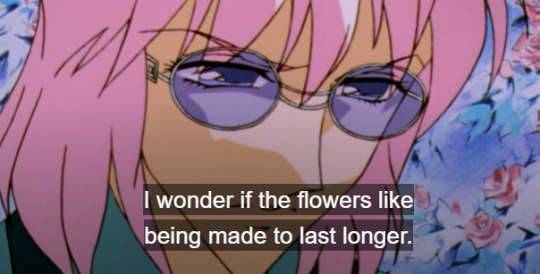
Nothing in this world is eternal, although a heart that longs for eternity could be considered beautiful.
Utena is also attempting to use the duels to protect Anthy, something Anthy never asked for her to do, and something that is actually just Utena selfishly using Anthy to give her some sense of purpose in life.
Nemuro and Utena both imagine themselves as main characters in a narrative, fighting for the sake of their loved ones, and at the end of their hero's journey they will be rewarded with everything they've fought so hard to earn. They're creating stories of their lives and making a narrative to give themselves a reason to keep going after death. For Utena it's a symbolic death, the feeling she should have died alongside her parents. For Nemuro it's his likely literal death, as apparently the Nemuro Memorial Hall and everyone inside died fifty years ago and Mikage has been stagnating for fifty years as a ghost in Ohtori unable to remember the fact that the Mikage hall burning is the long past and he hasn't changed in all this time. They are figuratively and literally dead, and in need of a reason to keep living create a story where they are the main characters.
They also imagine themselves as noble, selfless heroes sacrificing for the sake of their loved ones. Yes, even Mikage when he's playing the villain role of evil therapist and messing with people's minds he's still talking about it as some great heroic sacrifice on his part. It's a bit extreme yes but it's to point out how ridiculous Utena's own hero complex about her duels over Anthy is, especially in Anthy's mind. Nemuro burns down a hall and declares himself a hero for doing so. Utena gets in swordfights behind the school gym class and declares herself a hero. Neither Mamiya nor Anthy ever asked for them to do this, in fact when Anthy starts to genuinely like Utena she asks for the opposite for Utena to run and save herself it's just they decide to do these things on their own while imaining it as some great sacrifice on their parts.
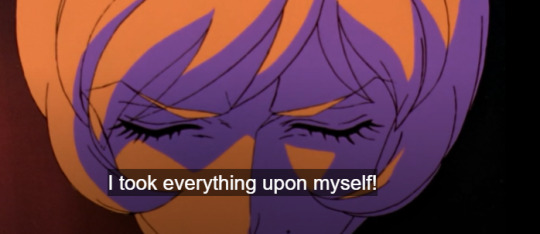
Even your brother's crime!
Souji... Come and see now?
Back then, in that place who was there. Who wasn't there? Who was it that really set that fire?
Mikage makes it like he's a hero who took the heat for Mamiya's crime of burning down the hall when really he's the one who burned down the hall, and he simply blamed Mamiya for it in his memories.
Everything Mikage is fighting for is based upon unreliable memories, lies, and illusions because you know moon arc.
Anthy openly mocks him for his misguided notion and his hero complex that he's doing this to save someone, by unraveling the memories he thought was guiding him right in front of his eyes, sabotaging him in his fight against Utena.
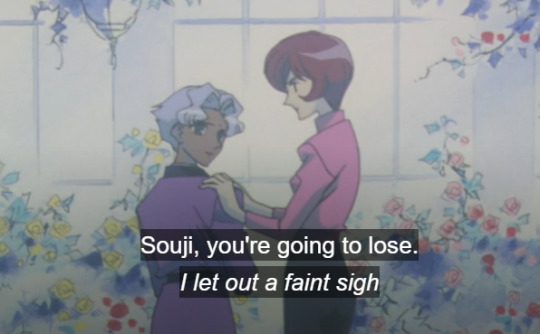
Souji, you're going to lose.
Mamiya!
She will scatter the rose you wear.
What? Where are you? Mamiya! Mamiya!
What the? Who's?
You can't beat her.
You will never beat my sister who dwells in your memories.
We see this exact same thing happening when it's time for Utena to fight Akio, just when she's about to win Anthy sabotages the fight, mocks her for playing hero and says it's impossible for her to have ever won against her older brother Akio. The way Nemuro cries out Mamiya's name in pain and confusion before realizing Mamiya has been dead for years and the person he's been talking to all this time wasn't the real one, even mirrors Utena calling out Anthy's name in desperation as she realizes she never once understood the true Anthy.

Akio calls Nemuro to tell him shortly afterwards that he was using his unreliable memory of the past in order to further his agenda at this school.
Akio: I exploited the illusion you cherished in your memory so much that you even halted your own time.
Akio: The period where you hid the possibility in your heart, not growing up, was useful.
Akio similiarly takes advantage of Utena's vague memory of the prince within her heart, in order to manipulate her into the dueling games even perfectly playing her prince later on to both lead her on by the nose and try to poison her relationship with Anthy.
Which is the greatest connecting thread between Utena and Nemuro. They both are creating fiction in their heads by imagining themselves as heroes in a storybook, and they have both built their entire motivations out of unreliable memories. The foundation they are standing on is a misremembered past. A past they've made into beautiful stories in their own minds.
Mikage: You sound like you're yelling out, "Don't touch my precious memory!"
Utena: What did you say?!
Utena: Don't even talk like you understand me!
Utena: My memory is...
Mikage: I see. It's that memory that's been supporting you up until now.
Mikage: No need to be ashamed.
Mikage: Because the memory you possess is a worthy one.
Mikage: Only those with beautiful memories are allowed to wish,
Mikage: "If only those days could last forever, if only I could still be what I was back then."
Mikage: I know that you're the same as myself.
Mikage: Your eyes are like those people who can't help wanting to make memories last forever.
What is a story but a lie? A fiction? The lies they are told by tohers and the lies they tell themselves are what manipulate them into going forward, straight off of that cliff. After all is there any character with less agency over themselves than the main character of a story? A character in a story doesn't have any free will after all they just go where the author tells them to go, and do what the author writes for them. However, to Mikage and Utena that doesn't even seem to matter because they're both so desperate they need something, even something they subsconciously know is a lie or doubt themselves to keep moving forward. If they don't even have that, then they're dead.
Mikage: I knew since the first time I saw you.
Mikage: You met the person important to you long ago, right?
Mikage: And so, that person changed your life forever, right?
Mikage: You're standing here on the strength of that illusion.
Mikage: That's why you were able to enter the Duel Arena.
Mikage: Am I wrong?
Mikage: After all, you're just like me.
The fools who are the heroes of their own stories, and characters in Akio's stageplay just keep moving forward until they walk off that cliff. They try to be storybook heroes from beginning to end, unable to see the problem in that until it's too late. Mikage represents Utena's own journey through the labyrinth of illusions that is the moon and what's waiting for her at the end.
The Black Rose arc foreshadows exactly what happens to Utena at the end of the story. Nemuro graduates from the academy, disappears, and all trace of him is gone and people quickly forget about him.
Akio: However, that's all over.
Akio: From now on, the path before you is not prepared.
Akio: You, graduate now.
Utena: Oh, darn it.
Utena: What a weird place we ended up in while searching for Himemiya.
Miki: There was a really big fire here a long time ago.
Utena: Really? So there really was that kind of trouble.
Miki: It seems there weren't any casualties, but since it was before the time of the Student Council, no records remain.
Miki: Let's see... What was the building called? Kushiro Memorial Hall...
Miki: Sounds wrong. Noboribetsu Memorial Hall? Argh! I hate it when I can't remember!
Utena similiarly leaves the academy and Akio comments that just like Nemuro she'll fade quikcly from people's minds.
Akio: It hasn't been that long since then, but everybody's forgotten about her completely.
Akio: She didn't cause a Revolution after all.
Akio: Now that she's gone, she was just a dropout to this world.
They also reach their tragic end for similiar reasons, they couldn't stop playing the role of the hero until the very end.

It's pretty much spelling out to us how the series is going to end in the second arc. Utena / Nemuro are brought into the dueling games on a false memory that's manipulated by Akio to give them a reason to participate. In their final duel, they're betrayed by Anthy and sabotaged in the middle of their fight causing them to lose. Afterwards they struggle against the truth. The result of them learning the truth is them being exiled from Ohtori Academy forever, and they are unable to save the person they want to save by playing prince, Mamiya was never alive, and Utena never got to know the true Anthy. All because they decided to play storybook prince in the first place rather than look at the reality.
Utena's however, ends on a much more hopeful note. As she's at least escaped the fiction of Ohtori Academy and Anthy insists that she is still there somewhere out in the real world. Just like the world in Tarot is the last card of the Fool's Journey, where as a whole person the Fool is now ready to join the rest of the world.
However, the Black Rose arc doesn't just foreshadow the ending of the story perfectly with Mikage's ending, it also is just the nature of the moon tarot card itself. People call it fillerly because there doesn't seem to be any real substantive change to the story, but illusions are illusions they're not supposed to be substantive. The characters don't change after the confrontation with their shadow selves.
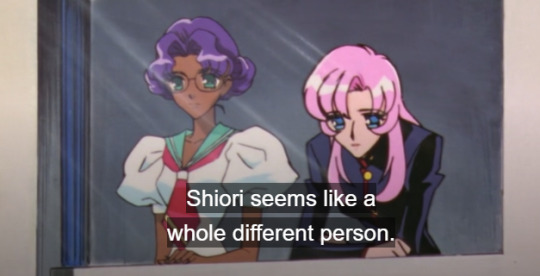
You think so?
Huh but she's.
She hasn't changed. Not a bit.
Number one there's no real end in the conflict between the shadow and the conscious mind and number two that's what happens with dreams they fade in the daytime and are forgotten when you wake up.
That's the moon in general too. Always there for you. You don't usually think about it and it doesn't serve any real purpose, but from time to time you look up at it... and it makes you feel better.
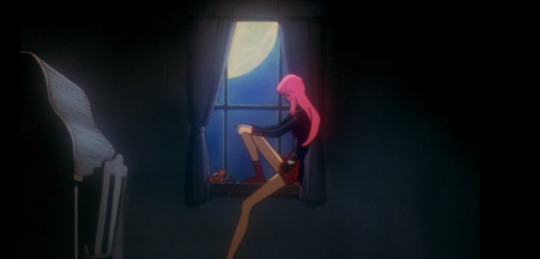
#askspookies#rgu meta#revolutionary girl utena#utena tenjou#nemuro mikage#akio ohtori#anthy himemiya
147 notes
·
View notes
Note
hello♥ I loved your and psycho's recent analysis posts about gojo after 236 because they made me realize I've kinda misunderstood him as a character for awhile. one thing I was wondering : how would you explain gojo's line about "nobody will have to be alone again" in the context of gojo consciously choosing to put a degree of separation between himself and others? and if he only fights for himself, why does he care about saving the youth of kids or raising the next gen of sorcs?

The answer to this question, like most questions with Gojo is "it's complicated."
Gojo himself says that he chose to draw a line between himself and others as living beings, and even if they loved him he never expected them to understand him. Yet, when talking with Shoko he says that he's doing all this so no one will ever be left alone again. If Gojo was the one who decided to separate himself from others then why phrase it like he was the one being left in the dust?
In this scene he's likely referring to Geto as the one who was "left alone" rather than himself. We know almost nothing about Gojo's childhood except for the three years of his youth in high school, because in story those are the only backstory details that matter to his present motivation. We're shown his high school days because his present motivation as an adult is all about what happened to him in his youth, that's what shaped him the most as a character. That's also what informs the audience about his character.
If Gojo's own springtime of youth had not been ruined, it's likely Gojo would never have worried about students or gone into teaching, if only because Gojo is not like Geto. He doesn't worry about ideology or right and wrong the way that Geto does. The purpose of Nanami's statement saying that Gojo only ever wielded Jujutsu for himself not to protect anything else, is to point out the fact Gojo enjoys being a sorcerer. It's the hardest job on earth for everyone else, but because Gojo is so untoucahbly strong for him it's a chance to flex his ability at the thing he's best at. Gojo enjoys being a sorcerer, and besides being dragged down by the burden of protecting weak people he likely would never have noticed what was wrong with society as a whole had it not impacted him and Geto.
As for his statement about never leaving anyone else alone, it's likely Gojo's attempt to try to understand what went wrong with Geto and the reasons for why Geto defected. Gojo doesn't worry about ideals after all so he can understand there is something wrong with the sorcery world, but not why Geto would risk his life for a completely impossible ideal. He just knows that something went wrong with Geto and in a year of Geto spiraling he didn't notice until it was too late.
Gojo's understanding of the situation is likely that the reason he wasn't able to notice what went wrong with his best friend was because of the sudden power difference between them. Geto even lambasts him for this, calling him arrogant for calling killing humans impossible when it's something that someone at Gojo's power level could currently do. Gojo therefore accidentally calling attention to the fact that him and Geto are on different levels now by pointing out that Gojo isn't strong enough to carry out his ideal of a world of only sorcerers.
Gojo seems to think where his friendship went wrong with Geto was when Gojo became so powerful that Geto could no longer keep up with him anymore. In general because Gojo has always been so powerful that being a sorcerer doesn't wear down on him like it does other people, he probably thinks something along the lines of if Geto had siply been stronger in the past then Geto never would have been worn down and snapped as hard as he did. It's Gojo misunderstanding a relationship built on empathy and understanding because he sees everything through the lens of being a sorcerer. At some point Geto stopped being someone constantly around him and started being alone, and Gojo's trying to rationalize why that happened through the way he sees the world.
I think Gojo cares about the youth for multiple reasons, number one he genuinely does believe in his ideal of protecting children because the three years of his schooldays were the only time he felt like a human being. Number two, a more pragmatic execution of his desire to change the world of sorcery. It's easier for him to start from the bottom up by changing the next generation. If he just slaughters everyone on top he'll be viewed as a tyrant and they might even team up against him and fight back against him. It's easier for Gojo who wants to exist in the world of sorcery, to try to work from inside. Youths are also easier to make as his political allies because (this is Gojo being really pragmatic here) they're more impressionable.
The last part is where he projects both himself and his failures in his youth onto the next generation, and is trying to correct those things. He had a year to seek out Megumi after hearing Toji's dying request and only did so after Geto's defection. Gege's word of god confirms he only took an interest in Megumi because he was a strong student with potential, but I believe he saw a lot of Geto in Megumi.
Before this Gojo says "but... it looks like me being strong isn't enough, I can only save those who are prepared to be saved." Gojo likely intervened earlier with Megumi, because he thought there was nothing he could do for Geto who had already reached what Gojo dubbed beyond a point of no return. However, he could still help someone who was in Megumi's stage who wouldn't refuse any help like Geto did.
However, Gojo's way of helping Megumi is misguided formed by Gojo's own misunderstanding. He tells Megumi to get strong otherwise he'll be left behind, because he believes part of the problem with Geto is that he simply wasn't strong enough to keep up with Gojo.
It's Gojo's central misunderstanding, he wants to have equals but he doesn't want to have to stoop down to other people's level or get off his pedestal so instead he seeks to bring people up to his level. If he could create a group of intelligent allies who were on his level, not only would he finally have someone on his level but it's in their best interest too because they wouldn't suffer Geto's fate.
If Geto had simply been able to keep up with him, Geto never would have gotten lost and his friend would still be here.
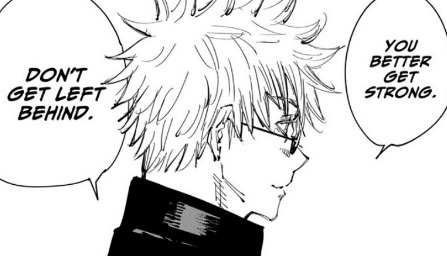
95 notes
·
View notes
Note
Do you think that Batman could empathize with Tomura and successfully reach out? They are both orphans with a dark side. The difference being is that Bruce was able to work through his darkness to be healthy(er) while Tomura had all his pain cultivated for 15-16 years.

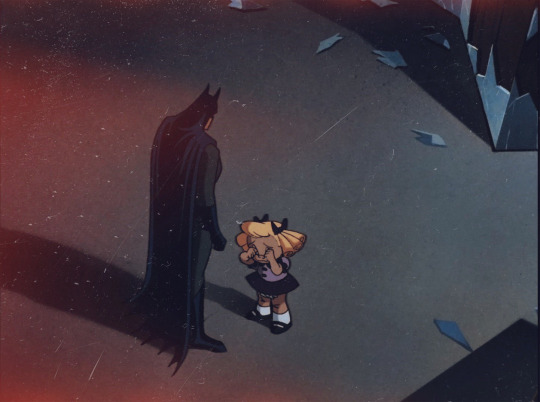
Yes. 100% yes. That’s not even a question for me. I’ve been dying for someone to send me a question like this, because it’s something I’ve noticed in the general fandom response to the pro-heroes and the hero kids. The thing is, the heroes in My Hero Academia don’t really act like good wholesome heroes. They certainly act like marvel movie heroes... in the fact that they have strong superheroes and fight a bad guy and have such a clear delineation between good and evil that many viewers take them to have propagandistic qualities. Like, there’s a reason that marvel movies have degraded to what they are today currently, and besides all the other factors it’s because these comic book heroes are really getting sanded down into a set of superpowers, a costume and a bad guy to beat with no ideals or themes behind their characters. My Hero Academia heroes aren’t really that heroic, they don’t really have any ideals they stand for except the extremely vague notion of defeat the bad guy. Yeah, Deku has “Save people” but Deku is noted several times to be an oddity among heroes.
The Pro-Heroes and the Hero Kids in My Hero Academia have this weird paradox to them where the story itself, and also in world hero propaganda sells the idea that heroes are incredibly wholesome, always selfless, people who go above and beyond to save and protect. Yet, the heroes in MHA are actually extremely cynical, and pragmatic, and they also really have no guiding principals beyond “Might makes Right.”
You can put all heroes on the scale of Spiderman <---------> Punisher.
To define them by whether they are a superhero focused on saving innocents, or a violent vigilante who is focused on punishing the guilty, the heroes in MHA are far more on the punisher scale of things than anyone either in setting or the fandom would like to admit. This is a universe where heroes like Hawks and Lady Nagant regularly commit state sponsored executions. This is a setting where Enji Todoroki is revealed to be a heinous abuser of his family and everyone in the superhero community is like... fine with it for the most part. They either don’t bring it up, or they think Enji does such a good job it justifies his position.
I mean, here to justify my accusation that heroes in MHA are far more on the punisher side of the scale. To compare to another manga, Jujutsu Kaisen and My Hero Academia have a similiar circumstance where a villain, Mahito and Dr. Garaki respectively are able to transform unwilling victims into mindless attack dogs by twisting their bodies into unseemly and horrifying shapes. Mahito’s altered humans, and Dr. Garaki’s nomus respectively seem to retain some sense of humanity and are in a state of pain. Nanami Kento, Shoko and Yuji all come to the harsh reality that there is nothing they can really do for the humans that Mahito has twisted, except for a swift mercy killing, and yet a lot of time is still given to the fact that killing something that is a human being is wrong and a heavy task even though it’s their only option, and two that the decision to kill someone is an extremely heavy burden to bear not made lightly. Nanami straight up loses all focus in a fight, and stops to wipe the tear of a former human when he realizes what they are fighting against.
Compare this to the way every hero responds to the Nomus in My Hero Academia. Enji without knowing whether or not they are truly sentient or even capable of being turned back into what they were, roasts one alive right away it’s his first action with them. Enji then later on meets a Nomu who is capable of intelligence and communication, and roasts it alive even harder specifically because the way the Nomu Acts, reminds Enji of a darker part of himself, and killing that enemy is perfectly satisfying to Enji because it allowed him to take out those personal frustrations. When Mirko learns that the Nomu are former human bsings she has no hesitation at all at bashing their brains in, in fact she’s almost delighted because she doesn’t have to hold back and that makes it easier than fighting regular villains. If the enemy is sufficiently dehumanized than heroes in my Hero Academia very easily resort to murderous methods, and it’s not just heroes like Enji, Mirko does it, heck Present Mic expresses the sentiment that Oboro would be better off dead then continuing his existence as Kurogiri.
The heroes in My Hero Academia are dark, almost myopic. I’m not saying you can’t enjoy them, but they are very different from the way heroes act in western comic books and I think a lot of people don’t know this because a lot of manga fans don’t really pick up comic books, and their biggest experience with western heroes therefore comes from movies.
So when I say BATMAN WOULD NEVER dehumanize a villain to the extent the My Hero Academia heroes do on a regular basis, I’m not saying that as a batman fan, I am saying that because Batman is probably THE MOST IDEALISTIC DC HERO. Yes, even moreso than superman. Batman is Clark’s hero. His inspiration. His good time boy.
Bruce would have noticed there was something off about Tomura right away in the early stages, if not the very first attack he waged on UA. I’m going to use two examples to prove my argument, one the fact that heroes also noticed that Shigaraki was extremely mentally unwell and just decided not to really care about it, and two Batman was actually faced with an extremely similiar situation in BTAS and his reaction is pretty much the opposite of All Might’s.
1. There’s Something Wrong with That Kid
To those who were paying attention to Shigaraki’s character from the beginning, even before we got to dig further into his backstory in My Villain Academia arc, or even be shown a more sympathetic and human side to his personality in the Overhaul arc, from his introduction Shigaraki shows signs of extreme mental distress. He is constantly exocriating himself, which is a form of self-harm that manifests under circustmances of extreme psychological stress. Shigaraki has a full on skin disorder that many people have because he is so poor at managing his stress he relentlessly picks and scratches at himself.
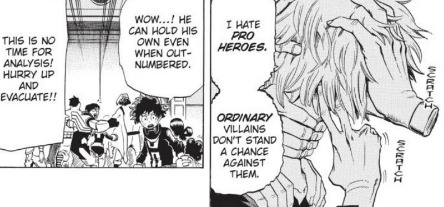
When he starts to lose in the middle of the fight, he essentially throws a tantrum, and not only does he immediately want to give up and go home, but he also lashes out at his own ally to try to vent that anger.

When All Might removes the hand from his face he has a momentary break from reality, and talks to the hand a physical object like it’s a person calling it “father” and apologizing to it.

Shigaraki also shows a clear grudge against both heroes, the failure of heroes, and the violence that heroes show (no kidding he’s a victim of violent abuse and the cycle of abuse in his family has an origin in his grandmother’s complete and total failure as a mother) that he clearly states in front of All Might once, and then Deku later the idea that heroes do not save people with their violence, and the implication that there are people that All Might have not saved and both times he is essentially brushed off by both of them.

Shigaraki’s mental distress is so obvious that even the heroes of My Hero Academia, who’s general response to villains is lock them up and throw away the key, noticed it. The heroes notice several of the symptoms I listed above about Shigaraki, but then decide to dismiss him as a man-child and then go on to say that he represents a kind of “pure evil” that villains may find attractive. The enertain the idea for like half a second that there might be more to Shigaraki that makes him different from the regular street villains heroes usually fight, and then they just dismiss the thought. Once again a common theme, the second All Might realizes he is Nana’s grandson he wants to go after Shigaraki to attempt to find him and reason with him only for once again Gran Torino to dismiss him as the kind of villain who’s beyond redemption and All Might to immediately give up on trying any other tactic than beating him down.

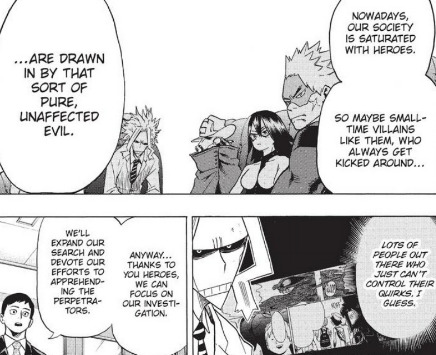
Now why do I say Batman would have immediately gone after Shigaraki and tried to reason with him and get him the help he needs? Do I have proof of him acting similarly? Batman in fact, comes across a similiar enough situation in one of the most famous episodes of Batman the Animated Series.
2. Man-Child meet Woman Child

Baby-Doll Batman the Animated Series season 3, episode 4 is one of the most popular episodes, and it shows most clearly the way Bruce’s brand of heroics is ultimately based on saving and empathy for his villains rather than just putting them down for the greater good. I could have gone with a lot of batman villains with much more clear and tragic origins, Mr. Freeze isn’t even trying to achieve anything villainous he wants to save his wife. Two-Face started out as not only Batman’s best friend, but a good guy and an ally of justice who was driven to insanity by a horrifying and sudden tragedy. Harley Quinn is a victim of grooming and abuse similiar to Shigaraki who has her entire sense of self warped and controlled by an abusive narcissist who quite literally turns her into a crude relfection of himself, to act as a pawn in his own evil schemes. I could use a lot of batman villains, but no Baby Doll, we’re going with Baby-Doll.
Mary Dahl is a washed up child actress with a physical condition that prevents her from growing up past a child, she’s sort of like Claudia from Interview with a Vampire, an adult mind inside a child’s body. Not only will she always be treated and regarded as a child for her physical appearance, due to her child as a former child star who’s show was cancelled and had no success in acting when she tried to do anything outside of playing the cutsey and innocent “baby-doll” on the sitcom “Love that Baby” she has ended up emotionally stunted and stuck in the past.
Mary Dahl’s fall to villainry is a bit less tragic than Shigaraki’s, she wasn’t like kidnapped and groomed since childhood by a villainous mastermind and turned into his own pet “make your own supervillain” project. She’s not getting work, but she’s not poor or destitute, there are former child stars who lose out on their childhoods and have no money to show for it, but she seems to have enough money to at least have an extremely competent agent and money to blow on her elaborate schemes. Her backstory is not nearly as tragic as Shigaraki’s, yet she shows several symptoms in common with Shigaraki, being a former child star like many child stars she shows severe dysfunction as an adult because it ate up her entire childhood. Child labor is bad people. Children who are not given room to grow up and develop as kids, have problems late into their adulthood.
She is also someone who feels rejected and left behind by society as a whole, it’s clear her only way of connecting to other people was the attention she received as a child star and the connections she had with cast members. She also experiences severe body dysmorphia I would say on level with Shigaraki’s, Shigaraki’s body dysmporphia is so bad he constantly picks at his own skin, his quirk soemtimes even causes physical damage to him and he feels extreme nausea at a near constant basis b/c of his emotional unrest. Baby-Doll literally experiences a same incompatability with her body, she has an adult mind, she craves to be a fully grown normal body, and a lot of her mental breaks from reality seem to come from how easily people mistake her for and treat her like a child.
Mary Dahl also shows severe dysfunction when it comes to regulating her own emotions. As tragic as Mary Dahl’s fall from fame is, and as much as it mirrors what happens to a lot of child stars in reality, Mary Dahl kind of also dug her own grave by her actions. Everyone on the cast thought she was notoriously difficult to work with, her show wasn’t cancelled on her, she left because the directors added in a new character she didn’t like and took attention away from her because of plummeting ratings. She left the show to try to take a more serious turn as an actor, once again to get attention and because she was on an ego-trip, then tried to get the show running again when it didn’t work for her but by that point it was too late. She’s also someone who just does not treat people well, she’s manipulative, she never engages people as her true self Baby-Doll is a role she is essentially playing, to both allow herself to violently lash out, but also to evade any responsibility for her own actions. It’s also ambiguous how much of the Baby-Doll persona is a genuine psychotic break (I don’t use the word psychotic lightly, I’m also not saying LOL look at her she’s so crazy, but there are genuine moments where Mary seems to mistake what happened on her TV show for reality which indicates that she’s not just trying to reclaim her former glory, that she is full on having delusions) there are also moments where “Baby-Doll” is a deliberate act she’s putting on, and Mary seems aware of what she is doing.
Mary Dahl is at the same time, delusional enough to believe she can kidnap everyone on her former show, and force them to just pretend to be the characters they were on her show, and playing dollhouse with this pretend family will somehow fix her problems. She is also, lucid enough to carefully plot and execute the kidnapping of several people, control a minion in her agent, and then evade capture from Batman several times. She is both a victim (she’s genuinely mentally unwell) and a villain (but not unwell enough she’s not aware her actions are wrong, she’s deliberately hurting people she just thinks her tragedy makes her entitled to that revenge). Mary Dahl thinks the world has wronged her and left her behind, that her show being cancelled was some great injustice done to her, and something she deserves the chance to rectify, even though as I just explained in detail that Mary was equally as responsible for the cancellation of her show. She is a person not willing to take any responsibility for her actions or see fault in herself.
You could even argue because of these quality Mary is way less sympathetic than Shigaraki, Shigaraki at least seems to have genuine critques about his society, and feels that he and the people around him have been rejected in an unjust fashion. Mary Dahl is upset her TV Show got cancelled and decided to make it everyone else’s problem. Mary Dahl’s problems are a lot more selfish, and smaller in comparison to Shigaraki’s, and yet the story itself does not downplay Mary’s distress because it is genuine to her.
In one extent, Mary is a danger to others, but she’s also a danger to heserlf. Like I said, it’s ambiguous how much but she’s clearly a mentally unwell woman. When someone is experiencing delusions on that level it’s a brain chemistry problem, and it’s also not something where it’s fair to go “Well, she has no reason to be mentally ill, it’s not like she was beaten, she’s just having an emotional breakdown because she’s not famous anymore.” I mean, what does it matter the reason whether she’s having a breakdown is a good enough reason or not, she’s clearly in extreme distress.
Number two, I think society as a whole tends to downplay the suffering of celebrities or child stars and make them seem like they are just entitled or spoiled for acting out, because they’re rich and famous and living a life most people would die for so who cares. But, HollyWood, the spotlight, and public scrutiny has a really bad psychological effect on people. Most people would not do well under such harsh public scrutiny all the time, and also when you make your entire personality around being a star and having the spotlight, also because in Baby Doll’s case there’s really no other career avaiable for her because of her condition then losing that is a pretty huge loss. Like, child stars who cannot either adapt to adulthood, cannot get work as adult actors, or just cannot even function as adults is a pretty common societal problem.
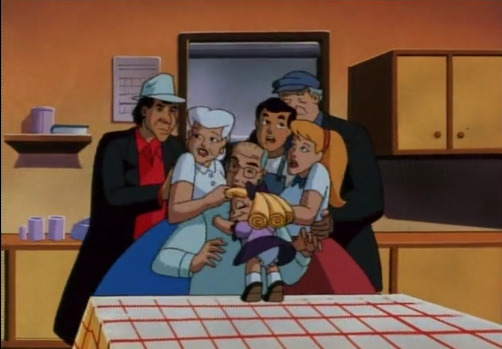
On top of kidnapping people, holding them hostage, she’s also someone who clearly needs help, like Baby-Doll is not just doing these things because she’s a selfish, entitled brat throwing a tantrum because she’s not famous anymore, she’s experiencing clear mental breaks from reality where she confuses her tv show for reality, she’s mentally sick and in need of treatment.
Baby-Doll is presented to us as a manipulative child star desperate for the spot light, endangering her cast because she herself cannot let go of the past for most of the episode, people around Bruce are pretty unsymapthetic to her, her attempts to get a more serious career is played off as a joke, the cast members do not like Baby-Doll and found her to be extremely high maintennance and difficult to work with even when she was on the show, Baby-Doll’s clearly not after the cast because of nostlagia, friendship or happy memories she has with her former cast members, but rather because she wants to pretend to be the the sitcom character who was surrounded by family who loved her. People constantly remark how crazy she is for thinking a tv show is reality. Even Robin says that he absolutely despised the “Baby-Doll” show, and it’s dismissed as kind of a cheesy sitcom with no real merit.
However, the last five minutes turn all of that on its head. Bruce Wayne, my darling, is presented to us as a man of few words. We don’t actually see Bruce’s reaction to what Baby-Doll is doing for most of the episode, we see Dick’s who clearly thinks she’s just crazy, Bruce the whole time is focused on just resolving the incident first, finding the kidnapped people, rescuing them from Baby-Doll’s grip. So Bruce’s absolute first priority is just to stop the villain from doing the bad thing, he stops the bad behavior and makes Baby-Doll unable to hurt others.
Bruce, the living embodiment of the term “Gap Moe”, because he is so closed off and not reacting to Baby Doll in any way, does not seem to be going out of his way to sympathize with her. That however, changes once the the threat Baby-Doll represents to others is neutralized. Baby-Doll then flees from Bruce with a Tommy Gun out into the middle of the night. The tables have turned and Baby-Doll has gone from a cackling villain, pretending often to be a scared little girl in order to manipulate people, to a genuinely scared and desperate person. Even the image Baby-Doll evokes fleeing from Bruce, is a sympathetic one, Baby-Doll despite being an adult woman still looks like a child, and acts several times like a woman-Child and she is fleeing from an adult man who picked his costume to terrify crimminals into submission.
Baby-Doll flees into a carnival ground filled with children, she has a Tommy-Gun on her, she’s still pretty much a direct threat to others, but the way Bruce approaches her does a complete 180. Bruce is calling out after her to stop fleeing, when she disappears into a tunnel, he’s telling her to stop not because he wants to arrest her, but because she’s going to hurt herself at this point. Baby-Doll is no longer a danger to others, she’s a danger to herself because she’s scared desperate, and fleeing, and instead of pursuing her to put her down Bruce is trying to stop her from getting hurt as she flees. This is also behavior he has shown to repeat, in Harley’s Holiday he pursues Harley the whole episode not to stop her because she’s on a crime spree, but because she’s freaking out and he doesn’t want her to be sent to Arkham and lose all the progress she made in her recovery.
Bruce pursues her into a mirror maze and this is where we get the most famous scene in the episode, Baby-Doll is still dead set on killing Bruce (this is also where Bruce shines, Baby-Doll is actively firing a gun at him and he is still calling out at her to stop because she might get hurt).
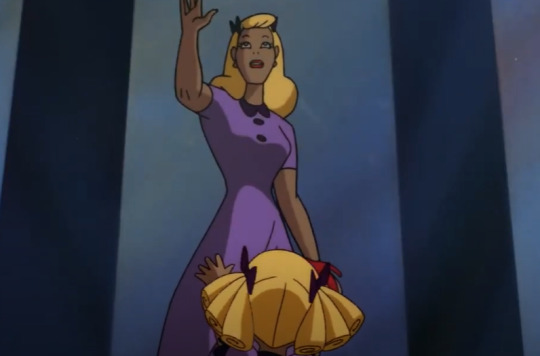
Baby Doll fires at the mirrors over and over again, until one of the funhouse mirrors shows her what she might look like as an adult, at which point not only does Baby-Doll come to a complete stop, but she talks not in her Baby Doll voice, but as Mary-Dahl.
Mary Dahl: Look. That’s me in there. The real me.
Mary Dahl: There I am... BUt it’s not really real, is it?
Mary Dahl: Just made up and pretend like my family, and my life and everything else.
Mary Dahl: Why couldn’t you just let me Make believe?
She then grows angry at realizing that she is trapped on the other side of the mirror and will never exist in that adult body, she starts firing at every mirror around her trying to get batman who stalks her once again as an unspeaking shadow, until she gets impatient enough to destroy even the idealized image of herself represented in the funhouse mirror. At which point the gun itself runs out of ammo, and Mary breaks downc rying. At that point Batman could say that Mary is just throwing a tantrum, that being a washed up child star doesn’t entitle her to hurt others, he could say that her tears aren’t even real because Mary Dahl has pretended to be a child in order to manipulate other people and merit sympathy literally this whole episode. Bruce does not do any of that. Bruce’s only action after following her this whole time, is to remove the gun from her hands so she’s no longer capable of hurting someone, and then when she hugs him, to return her hug and comfort her.
Mary Dahl: I didn’t mean to...
Because, utlimately she’s a human being who needs help. It’s not Bruce’s job to pick and choose who deserves that help, it’s his job to help people who need it.
So yes, Bruce would have noticed right away that Shigarki wasn’t just a violent child, but a child who is clearly suffering from distress and lashing out. He wouldn’t just dismiss Shigaraki as an entitled man-child because as I’ve just demosntrated, Bruce had a situation where he frankly could have just dismissed Baby-Doll as a selfish an entitled vain womanchild and yet he didn’t do that. He saw a crying person in front of him, and he helped them, and he was even trying to help her before she started crying and asking for comfort like a more standard victim TM. Letting a child who shows clear signs of abuse like Shigaraki has go unhelped is not only out of character for Bruce, it basically is against everything he stands for as a hero.
And if you still don’t believe me on that, here’s a quote from the director of the final installment of the popular Arkham Series, “Arkham Knight”, a game that features a character Jason Todd who was similiarly groomed over a long period of time by batman’s arch enemy into an enemy for batman to fight.

#askspookies#batman#dc meta#dc comics#dc comics meta#batman meta#bruce wayne#btas#batman the animated series#shigaraki tomura#mha meta#metasks#ironically this long post is not bashing MHA for having dark heroes#as much as i love idealistic heroes my second favorite marvel hero after spiderman is daredevil#my third favorite is the punisher#though versions of the punisher that are aware#that he's not doing the right thing#the line between heroics as essentially volunteer work#and heroics as vigilanteism#is a fascinating concept to explore#jason todd is much more interesting as a violent drug lord who is still soft on victims#then he is as a much more sympathetic and palatable edgy anti hero with daddy issues#its just the extreme dissonance in mha in how the heroes are written#and how they are framed#my biggest example is hawks of course#hawks goes to extremely dark territory that makes for a fascinating character#only for hori to completely back off on that plot#and go back to framing hawks as an idealistic hero obsessed with saving people#that's just a clear example of having your cake and eating it too
254 notes
·
View notes
Note
Following the events of the latest chapter I have to ask what is your prediction for how the story will go from here
I have a general prediction for the final three fights after we finish the Kashimo one. They're all foreshadowed by the animation book covers.
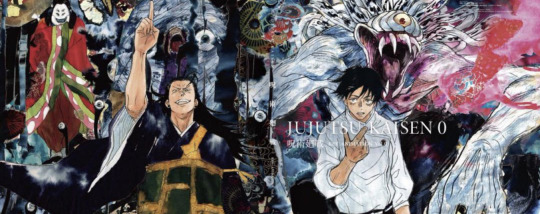
Yuta vs. Geto - The cover for Jujutsu Kaisen Zero features Yuta fighting against Geto. Link, you say. Yuta already fought against Geto. Well, they're called parallels - Yuta is perfect to be the one to finally put Geto's body to rest right alongside Gojo by defeating Kenjaku. Kenjaku said that Yuta isn't a threat to him during the Shibuya arc, and Yuta already stated that he wants to kill Geto again by himself so Gojo won't have to kill his best friend.
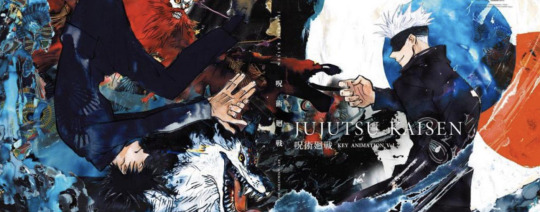
Gojo vs. Megumi - We've already cleared this one! It ended with Gojo's loss and Sukuna still in control of Megumi's body. It kind of had to end this way though, because it's meant to lead into the real final fight of the manga.

Yuji vs. Sukuna - Sukuna and practically everyone else in the fandom has written Yuji off as someone not important anymore, but Yuji is still a really important character and he's set up to do what Gojo failed to do and save Megumi. As Gojo was only fighting for himself it was impossible for him to reach Megumi buried deep in Sukuna's subconscious, but Yuji has not only made it his goal to find a way to still save him but there's the words Megumi used to save Yuji at his lowest point
54 notes
·
View notes
Note
WHOOO that was a loaded answer and I loved every word of it OP! I am curious if you've seen the movie hereditary. I know some other post on tumblr talked about how the movie had a massive influence on Gege and it's shown pretty clearly between Megumi and Sukuna, so I was wondering if you had any input on that out of curiosity.
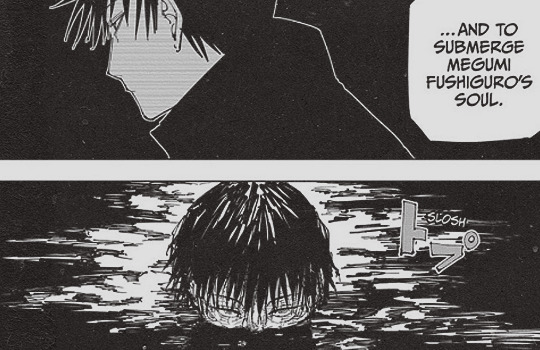
I've seen the movie hereditary. I think you're referring to this post about Hereditary's influence on Jujutsu Kaisen. I wouldn't put it past Jujutsu Kaisen to be inspired by other media, it's also a manga with several horror elements itself from the premise to the existence and designs of the curses.
For those who haven't seen the movie hereditary he's a quick and silly summary:
A woman buries her mother and it's heavily implied that the mother was abusive. Also she was a Satanist who didn't approve of her daughter's non-satan loving lifestyle. The mother Annie has two children Peter, and Charlie. Annie thinks her daughter Charlie is kind of annoying so she tells Charlie to go to a party with her brother and stop bothering her. At the party Charlie eats a weed brownie and has an allergic reaction to it, and so they rush her home in the car. However, Peter is speeding too fast and Charlie's sticking her head out the window so she gets instantly decapitated and dies.
Then - and this is the greatest scene in any movie ever made. Instead of calling the cops, or the hospital, or his parents Peter just drives home, parks the car in the garage, and then leaves his sister's dead body as a fun little surprise for someone to find in the morning.
After that a cult pretending to be a grief support group tricks Annie into using a ouiji board to summon Charlie's ghost back, but instead they summoned the demon Paimon, who takes over her son's body at the end of the movie.
The post I linked above posits the Megumi and Sukuna possession plotline, which has basically been the longest running arc involved with Megumi in themanga was directly inspired by the ending twist to Hereditary where Peter is made to host Paimon. Even if it's not a direct inspiration it's a pretty apt comparison. Hereditary is basically a movie about trauma being passed down through three generations until it culminates on Peter as the last link in this chain of abuse.
It's heavily implied that Grandma Satan worshipper was not a good mother, and at the beginning of the movie before tragedy even strikes Annie is completely checked out on both of her kid's lives. She's not really a mother in this family unit before the family destroying tragedy. You could say Charlie's death happens in the first place because her mother didn't want to put up with her and sent her away instead. Then after the tragedy, Annie's got a clear scapegoat to blame in Peter who caused the car accident yeah, but number one it was a pure accident, and number two he's a teen.
Grandma Mrs. Satan's poor parenting -> Annie not liking her kids -> Neglecting Charlie -> Charlie's death -> Annie scapegoating Peter for Charlie's death -> Peter is possessed by the same cult that Grandma Satan belonged to.
There's a circular quality to this grief because it's implied towards the beginning of the film while Grandma Satan didn't get along with Annie she started to connect with her daughter's children soon after Charlie was born because she saw Charlie as a prospective host for Paimon. So, it leaves the question that this might have been the plan all along, Grandma always planned to take one of the kid bodies and their mother was unable to break the cycle or interrupt grandma's plans because she was too caught up in the circle of grief too.
Ari Aster has gone on record saying the movie is about familiar trauma being passed on through generations:
I knew that I really wanted to make a film about the corrosive effects of trauma on a family unit. I knew that I wanted to make a film that had sort of an ouroboros quality about a family that’s basically eating itself in its grief. [SOURCE]
Megumi, much like Peter is the last link in a chain of trauma. I explore that concept in more depth in this post, but basically Megumi is the last link on the chain that starts with the Zen'in and Toji. Toji is rejected by his clan and basically has no family or support inside of Jujutsu Society. He flees it, finds some stability in Megumi's mother for awhile but after losing her he decides to stop caring about himself or others.
Toji then repeats the cycle. Toji is the famous sorcerer killer but in story we see him victimize several children. He kills Riko Amanai in cold blood for cold cash right in front of Geto and Gojo, the aftermath of which would affect them for years to come. He then absolutely brutalzies both Geto and Gojo who were also teenagers at the time though they were incredibly powerful ones. FInally, he also abandons his own son, sells him to the Zen'in and leaves him without a guardian or adult in his life to take care of.
The trauma that began with the Zen'in -> leads to -> Toji's actions as the sorcerer killer -> leads to -> Toji's abandonment of Megumi and Megumi having no parental figures in his life to take care of him.
Gojo is also a chain link in this cycle. His loss to Toji is something Gojo still remembers to this day, as the first and only time someone ever made him feel fear in a fight. He literally cites Megumi's resemblance to Toji as the reason that he has no problem fighting Sukuna while he's in Megumi's body.

Then, is Gojo trying to overcome this cycle of abuse by intervening in Megumi's case and making sure he wasn't sold to the Zen'in Clan?
Well, Kiiiiiiind of. It's clear is motivation is to try to save Megumi from becoming like Geto. After Geto's defection Gojo comments that being strong isn't enough to save people you have to save people who want to be saved and then goes to find Megumi early, like he's trying to intervene earlier because he regrets not being there in time with Geto.
However, this is where I say Gojo's lost to Toji gave him trauma he has yet to recover from. Ever since Gojo's awakening as "the strongest" he believes that strength is the solution to every problem. Yes, even after he had the revelation that being the strongest isn't enough to save some people. Yes, it's a contradiction. Gojo's brain is a complicated and scary place, us mere humans aren't meant to totally comprehend what goes on inside there.
Since his awakening against Toji, Gojo has always solved his problems by being the strongest, and being the strongest alone. His solution is to raise allies who will be as strong, or even stronger than him. Megumi who has the Zen'in Clan's strongest inherited technique, and one that supposedly killed a six-eyes user with the limitless in the past seems like the natural candidate.

On top of that it's clear Gojo sees a lot of himself in Megumi. They're both child prodigies born to one of the three great clans, with that clan's strongest single technique. Considering Naobito made Megumi the Clan Head in his last will and Testament, if Megumi had been raised by the Zen'in he probably would have been given a similiar childhood to Gojo's (spoiled child prodigy raised as a tool for the clan). However, Megumi is not Gojo and Gojo seems to have trouble ferreting out those differences.
Which is why we see some frustration on Gojo's end that despite the fact they have their respective clan's powerful techniques, at his second year Gojo was already a special class and well on his way to being considered the strongest while Megumi himself has a tendency to coast on his talent instead of applying himself and doesn't think it's even remotely possible for himself to get as strong as Gojo.
Gojo does not understand why Megumi doesn't "swing for the fences" the way that Gojo and Yuji does. Why he comes off as so unomotivated and fails to capitalize on any of his blessings.


However, while Gojo is able to notice the symptoms, he doesn't understand the disease or rather the cause of Megumi's behavior. The first being that Megumi is not Gojo. Gojo may find a lot of things similiar about their situations, but no matter how much Gojo tries to mold Megumi into a successor Megumi is not going to be Gojo.
That's where we get back to the connection to Hereditary. In hereditary basically the cult's grand scheme in the movie is to manipulate events to mould Peter into the next successor to Paimon, and Peter himself is not only a bit of an agenciless victim to all of their schemes as the cult progresses, but because of the failure of their mother they have no parent or adult to protect them from the cult's actions. Peter has a missing parent figure, and another figure trying to actively manipulate him until he's worn down enough to fall victim to Paimon's possession.
Not only is the story a tragedy in the genre sense, hamlet, romeo and juliet, etc. etc. but the victim Peter is agenciless in his actions like most victims in tragedies are. Everything in the world just wears him down, he has no support from adults, and no escape, he has little choice in the things that happen to him until eventually he gets his body taken away from him. HIs agency is literally stolen because he no longer can control even his own body.
Someone on reddit put this better than me:
Hereditary portrays how one might lose conscious control over his or her actions; be overwhelmed by the subconscious: possessed. It's symbolised with decapitation – a separation of mind and body. The body is what keeps the head up top and grounded upright. If they're separated, a person disorientates and loses his/her sense of up and down.
Suffering without being able to interpret it is torturous and can make you want to stop trying to interpret all together. If you think of home as a person's frame of interpretation, the treehouse is where the film's themes come together:
Decapitation is a pretty common image used in the movie hereditary. Two characters die from swift decapitation. Is there a clearer symbol for loss of bodily control then having your head chopped off? Losing all five senses? Losing your ability to move your body?
Megumi is also a character who has lost control over his body and actions since Sukuna's possession of him, and the grief over loss of a sister has caused him to stop fighting for control entirely but did Megumi have a lot of control over his own life before that?
There are no adult figures who are trying to protect and care for Megumi. That was his father's job, but Toji abandoned him. Megumi and Tsumiki are essentially left to fend for themselves in the world of adults with little choices.
Megumi is given two choices, go to the Zen'in who are going to raise him to be a sorcerer, or go to Gojo who will raise him to be a sorcerer in a slightly less misogynistic environment. There's no option where Megumi gets to choose not to be a sorcerer because Gojo's "help" comes with the huge asterisk*
*If you don't work as a sorcerer for jujutsu high we won't pay for your food.
Megumi was already being molded into being what someone else wanted for him to be - in this case Gojo. He was being raised as one of Gojo's allies and successors with little to no input with what Megumi wanted out of life. In the process Sukuna ends up hijacking Megumi's body and moulding Megumi to be useful for Sukuna's ambitions instead. Which is why this is so similiar to the tragedy in Hereditary it kind of feels like in traditioanl tragedy fashion Megumi has the agency of the main character of a tragedy. No matter what he does he's playing into someone's hands. So many people have plans for Megumi and how they want to use him and Megumi's just some teenage kid caught in the middle of it.
Sukuna sets up his plan for possessing Megumi at the start of the story. Megumi was taken in by Gojo and turned into a sorcerer and his tool against the elders before the start of the story. Annie's grandma always planned on putting Paimon into one of her children, and Annie doesn't figure it out until it's too late and we're already seeing the effects of her grandmother's long game plans.
So yeah, Hereditary and Jujutsu Kaisen are both about this intergenerational cycle of trauma, and how it will always affect the weakest members on the chain (children).
#megumi fushiguro#hereditary#askspookies#watch this post get like two notes#i doubt there's much overlap between jujutsu kaisen enjoyers and horror fans but#i'd be shaming myself as a horror fan if i didn't answer this question seriously#jujutsu kaisen#ari aster
56 notes
·
View notes
Note
oh mannn that cycle meta got me thinking (I love your metas btw) since the story is slowly wrapping up do you think that the story is going to end on a “the cycle is broken” note or more like… “the cycle is destroyed” note? I mean the whole jujutsu system is not only made up of the higher ups, it also consists of the big three jujutsu families, the zen’ins, the Kamos and the Gojos as Megumi mentioned in the goodwill event arc and they all desperately try to uphold the current system and keep the toxic cycle going, but I’ve been wondering… cause I don’t think killing kenny and sukuna is going to solve the entire problem (like at least to me these two are just using and toying with the current system. they don’t really seem to care about it, since they have their own plans) and now… well since maki annihilated the entire Zen’in clan, and THEN gojo (at least it was implied it was gojo, but who knows) killed the higher ups maybe there’s a pattern forming lolol so that only leaves the Kamos and the Gojos, so assuming once they’re gone (along with the heian boomers)… would that break/end the cycle? I mean I don’t think playing safe politics would ever work or really change anything, because the system only cares about upholding itself, so the only way to end is to completely destroy it..?.. but I don’t know
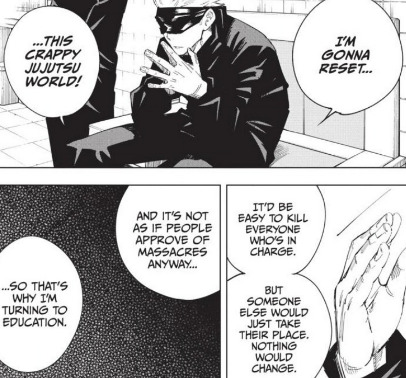
I'm not actually sure about whether or not the system is going to be truly broken by the time the manga is over, because you yourself said that both the higher ups and the Zen'in Clan have been purged now by someone slaughtering them, but... that's the exact kind of slaughter that Gojo was speaking out against and said would not work in the first ten chapters. For Gojo to suddenly approve of slaughter and the story to take that route in the end game is just odd.
We have not seen the fallout of Maki killing the Zen'in Clan and if there is actually going to be any consequences from that in-story, or if Gojo's even heard the news of that happening so it's hard to comment on that event.
However, we have witnessed the immediate result of the slaughter of the higher ups. ALl that ends up happening is Gojo places Gakuganji in charge instead, someone corrupt enough to organize an assassination of Yuji, and who killed Yaga under orders with no consequences.

Which is what Gojo warned of earlier in the first ten chapters, that if someone did bother to slaughter the higher ups, then the people who replaced them would not be much better. I'm going to borrow from some tags @hxhhasmysoul put on a post of mine.

Gojo wanted to raise strong and intelligent allies who would replace him as the next generation and a better alternative to the previous generation that's still currently in charge and holding onto power by sacrificing the youth.
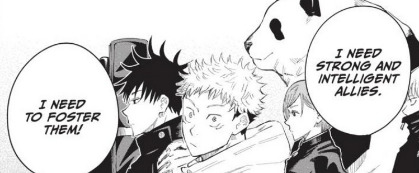
However, he didn't raise them to do political reform of think for themselves about how things could be better, he raised them to be Mini-Gojos. Gojo's students for the most part do not look at Jujutsu Society as a whole, and use might makes right as justification for their actions. Gojo's students have declared on multiple occasions that they don't care whether or not what they're doing is right or wrong.
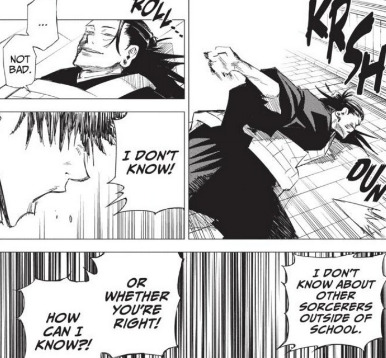
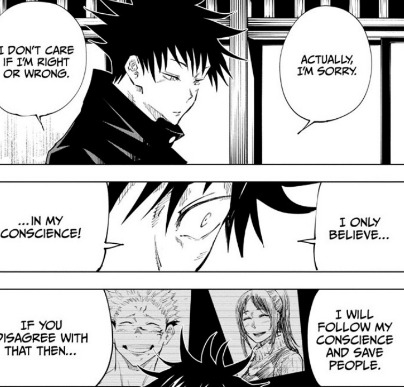

Gojo's students all call themselves cogs in a machine. He hasn't raised a set of political reformists, he's raised a set of kids who are all individually very strong, and also loyal to him. Which is like the underyling motivation of Gojo's goals all along of going with education to raise up pupils, he was always going to do this, just replace whoever was in charge with people he handpicked. Gojo's students not really caring that much about reforming the system isn't really a flaw in Gojo's plan, it's a feature.
Which is why when Gojo is sealed in the box, his students don't even try to defeat Kenjaku or Sukuna, their only goal is to get him out and let him take care of everything. Gojo's students are all ultimately loyal to Gojo's agenda because he raised them to be that way.
If Gojo dies against Sukuna however, it will show that Gojo's methods have failed and the main characters will have to scramble to find some other way of dealing with the problem. They'll no longer have "Just get Gojo out of the box" as the magical key to their problems. If there is going to be a big change in the story, it's probably going to be pushing things away from Gojo's individualist mindset. When Hakari is convinced to come with Yuji, Kirara mentions that despite hating the higher ups Hakari's always felt a strong connection to the people at Jujutsu High.

THe only reason that Gojo came out of the box in the first place, is a weak person who Gojo would write off as a random extra, saved Kurusu when she was falling off a building when all of his super strong students absolutely failed in that situation.

The most toxic attitude of sorcerer society is that individual strength means everything. Gojo hates the collectivism and tradition that requires people to continually sacrifice themselves for the collective good that keeps the higher ups in power, but collectivism isn't always a bad philosophy the same way that individualism isn't always good, they can both be taken to toxic extremes. The higher ups maintain their power through toxic ideas of collectivism requiring the sacrifice of others. Whereas Gojo's faction is the toxic extreme of individualism, which is why Maki, and then either Gojo or Yuta went on a murder spree with the elders. The true advancement from the toxic ideas of sorcerer society would be finding a balance between those two.
Which is probably where the real challenge in the manga is going to come, where Gojo's individual philosophy fails him and he gets either defeated, or just eaten by Sukuna and the kids finally have to learn how to function as a group instead of a loose collection of individuals. If Jujutsu Society is destroyed effectively by the end, then it's likely Gojo their biggest and most useful cog in that machine will perish alongside of it to make room for all of his students.

86 notes
·
View notes
Note
I know loads of jjk fans want Itadori to have this big power up to go 1v1 against Sukuna but, is it bad that I actually prefer him not gaining any op abilities? I kinda feel like that would be too obvious of a route for Gege's writing tbh.
I doubt at this point Yuji is going to get a cursed technique for what is most likely his last fight in the manga. In fact, Yuji not attaining a cursed technique so far makes him pretty unique as far as shonen protagonists go, he's not like Ichigo who started out just as a substitute soul reaper and then became a soul reaper quincy hollow.
Yuji is most likely going to beat Sukuna by saving Megumi, rather than beating him in a fight. As I said Gojo lost because he didn't prioritize saving Meugmi. Also I think it's karmatic for Sukuna if he doesn't get to go down by being killed by a stronger opponent like he wants to, and instead is defeated by someone he looks down on as insignificant (Yuji) and something he thought was worthless (companionship between Yuji and Megumi).
51 notes
·
View notes
Note
Hi there!! I really enjoyed reading about how you approach writing and characterising characters like Nanako, Mimiko, Nobara or Gojo so I’ve been wondering how do you go about writing someone as angsty and downright violent yet soft and childish at times like Megumi? Boy really had a cursed life for someone named blessing… so I feel there’s a lot to unpack when it comes to his character. Do you have any headcanons for him or do you mostly base his characterisation on what we’ve been shown in the manga? And how difficult or maybe easy you find writing him?

Megumi's actually the most complicated and well-written character in the manga (this is the part where @theanimepsychologist appears to high five me) so it's understandable you might have trouble writing him.
You don't really need to fanonize Megumi, because everything you need about him is already there in the manga. He's a jungian character who literally uses his shadow as his weapon to attack people, so the story delves incredibly deep into his inner world probably moreso than Yuji the main character.
To begin with though, this is my favorite way to describe Megumi:
Fushiguro had intended to just pay and leave but with his serious personality, his idea of leaving was dismissed by Itadori’s reasoning.
However, his eyes that were as deep as the night that peeped out from the bottom of a deep ditch became even more lifeless.
Fushiguro tried once more to switch off his self-awareness.
Numbness was the safety feature of life. If he did not think of a way to protect his spirit, it would not be strange if a curse was born.
"Numbness was the safety feature of life", every behavior Megumi exhibits is an attempt to suppress his emotions, to numb himself down and feel nothing.
This is what makes him a Jungian character. His primary personality trait isn't being grumpy, or serious, or anti-social, it's being avoidant. Which is why it's funny people often compare him to the other black haired rival characters in shonen jump, because he's nothing like Sasuke.
If you wanted a character to base your Megumi characterization on, the closest comparison is Killua. The abused child who ran away from a family of assassins, who thinks absolutely nothing of himself while describing his best friend in the gayest way possible as pure light. Killua's primary character trait is also avoidance. He doesn't really want to be a better person at the start of the story, he has no problems with killing people, he just wants to RUN AWAY. Which is also why he takes the one sibling he likes from the abusive household and kind of just leaves the rest of them behind like it's none of his business.
Megumi's primary character trait isn't anger, or violence, even if he's both of those things it's avoidance. He wants to avoid both the people in his life and his problems whenever possible until it's too late. He doesn't want to analyze himself or his own actions, which is why I made the banner image of this post Megumi straight up saying "I don't care if I'm right or wrong." This is how you get the contradiction that is Megumi, someone who self-righteously lectures Yuji in the first few chapters that he doesn't care if a prisoner died because they hit someone with their car by accident, then one hundred chapters later in the culling games blatantly says "I'll totally kill people to score points."
Megumi's simultaneously extremely strict and lawful, but also does not think those laws apply to himself because he doesn't want to think about himself. He has no image of himself. This is where you get to the childish aspects of his character. His second biggest character trait is that he's basically an eternal child. He can't handle any of his emotions in a mature way like an adult would so he just doesn't. The reason he hides all of his emotions in the dark and ignores them is because he doesn't have the tools to deal with them. His own feelings are the leaky roof that he can't afford to fix so he just has to pretend it's not there.
Megumi also isn't really trying to grow up or grow past his mistakes, because he is stuck in survival mode. Megumi's a child because he has no proper adult role models in his life. Yes, this is including Gojo. If you want a real life metaphor for the way Megumi behaves, he's like a foster kid passed from house to house until he's eighteen who never connected with any of his parents and was probably treated as a renter by them instead. Megumi himself in story is kind of treated like he's more mature than others too, just because he has a more serious personality, and has been forced to carry a lot of responsibility at a young age (by Gojo).
Which finally, you have to look at the two adults in Megumi's life who are responsible for a lot of his behaviors. Toji is someone who abandoned Megumi, and not only that he took the money he gained from his jobs, and selling Megumi and practically gambled it away and blew it on stupid shit. He failed in his responsibilities to Megumi every step of the way. Yet, there's a strong resemblance between father and son. Toji is the way he is because he was abandoned by his family his entire life and cast out, and wound up doing the same to Megumi. Toji also, seemed to use Megumi's mother as the only good thing / the only good influence on him and when she died he practically gave up. It's the same for Megumi, he basically used Tsukimi the same way as the person who inspired him to be good. Without Tsumiki, look at the despair that Megumi falls into and how he stops fighting Sukuna entirely.
Then you have Gojo, who let's just ignore the child soldier aspect of the way Gojo treats Megumi for now. I think the worst influence Gojo has on Megumi, is he expects Megumi to be exactly like him. Gojo and Megumi were both born with their clan's strongest technique, they're both natural geniuses who learn whatever they try to learn quickly. My friend Psycho had this to say about it.
Isn't it ironic how Gojo is the one telling Megumi he doesn't know how to bring out his best? Megumi is your class "I'm so naturally talented everything comes easy to me, but I don't know that I don't know this, so I don't try or strive hard for anything."
Gojo and Megumi are similiar in a lot of ways, but if Toji represents Megumi's violent side and the worst of his trauma, then Gojo is Megumi's avoidance. Gojo is also someone who doesn't want to form connections with people, who is stuck isolated in his own little world and never really changes or adapts to circumstances because he's always been perfect at what he does.
Gojo tried to raise Megumi into another Gojo, but failed because Megumi is different in ways that Gojo doesn't understand. Megumi doesn't really want to strive to be the best sorcerer in the way Gojo does, because Megumi was forced into it by circumstances. Gojo was like, Megumi if you don't come with me and do sorcery jobs for the school then your sister will be abused by the Zen'in. THis is totally a choice I'm giving you. Gojo doesn't understand why Megumi would have so many mental hurdles that would prevent him from reaching his full potential. And I think the biggest reason for this is because Gojo basically treated Megumi as a miniature adult from the day they met onwards, instead of treating him like a child. Gojo didn't have to raise Megumi, but the bare minimum he could have done is realized that Megumi is a child and not an adult and can't handle the responsibilities or an adult and doesn't have the emotions or maturity of an adult.
Gojo doesn't realize that however. He expects Megumi to deal with the crushing responsibility of being an adult, because that's how Gojo was raised and look at Gojo he's doing just fine he's the strongest.
So, like to cap this all off Megumi is a character with a pretty deep internal world made up of all the emotions he's repressing.
I'd say to other people he comes off as quiet and unpleasant. He also keeps interaction with others down to as minimum as possible. If he's interacting with strangers, he tends to be respectful, because he's projecting the personality of someone more mature than he really is. He's also the one who by default tries to act responsible and make the plans for other people even if he's the youngest one in the group. All of these things are because Megumi 1) feels a crushing responsibility to be the adult in these situations, and 2) also wants to avoid that responsibility hence his quiet and antisocial behavior as a default.
Megumi is also a male tsundere, which is how he deals with even the people who's closest to him. A lot of his dialogue in regards to Yuji is just some version of "Shut up, Baka" whereas with Nobara he tends to just kind of ignore her when she's being annoying and let her tire herself out.

Megumi also has incredibly low self esteem so when you're writing his internal dialogue, you should have him basically describe people like Yuji in the gayest terms possible much like Killua, while at the same time insulting and belittling himself. He props other people up to make himself look smaller in comparison.
Megumi's also in general pretty self-loathing. That's another reason why he represses himself so much, because he just sort of hates himself. He thinks he's a shitty brat who can't do anything right. When Megumi tends to pull more morally ambiguous things like advocating for murder, or getting too violent in a fight, he tends to justify it as "I'm not a good person like Tsumiki and Yuji so it's okay if I get my hands dirty". Which isn't a good excuse but it's very sad that a sixteen year old boy is unable to see the good in himself and is constantly comparing himself to others and finding them to be better.
Finally, Megumi's kind of like a parentalized child, at least in the fact he's been treated as a mini-adult by the biggest adult caretaker in his life and is expected to function like one. Therefore, Megumi has an image of himself that he's more mature than the people around him and knows better when he doesn't. He also doesn't really seem to grasp when he's being childish or angry or immature because he doesn't see himself that way, he's the adult, he'a always forced to be the adult.
Okay, I hope that helped you even a little bit Megumi is a pretty complex character to grasp, if you want even more inspiration then just read Hunter x Hunter.
55 notes
·
View notes
Note
Since in your future fanfic you will have Nobara and Mai relationship & communication to grow to the point where Mai is able to tell Nobara her deepest secrets, with Nobara being the listener.
Would this also mean that Nobara would feel some sort of guilt as a result? Because Nobara had said some nasty things towards Mai. I could sort of imagine Nobara feeling terrible after she understands Mai’s pain and trauma.
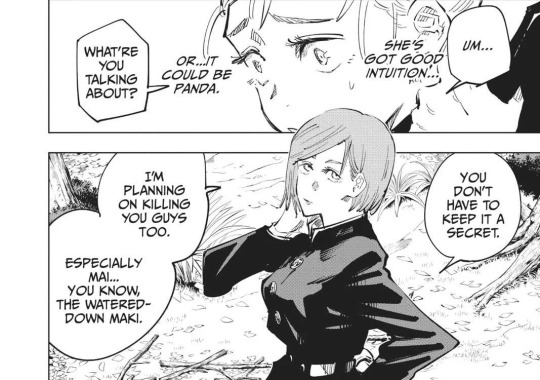
Yes, I do think Nobara would feel guilt for the way she dismissed Mai's pain in the past. Especially in my Nobamai fic, Werewolf. I want to make Nobara's arc for the whole series to be her learning how to treat the people in her life that she's friends with better. Because despite Nobara being unbrash and kind of a bully at times, her entire character revolves around the fact that the few people she lets into her life she's a ride or die friend towards.
Nobara's dying flashback against Mahito is her middle school friend who she remembered saying goodbye too at the railway station. Despite the fact they were best friends, Nobara sort of took her for granted because she has a stronger personality whereas her friend was more weak-willed. However, when they're saying goodbye Nobara clearly regrets leaving her even if moving to the city is something she has to do.
Nobara is a character who I think makes a lot of mistakes like this in regards to relationships, even though she genuinely wants to be close and connect with others. In regards to Mai, Nobara is actually being the type of person she hates the most. Nobara decries the people of her home town for judging Saori without getting to know her. Yet, she makes the same judgemental statements about Mai even claiming she doesn't care about her childhood even when someone attempts to explain it to her.
I don't think Nobara's genuinely that callous in regards to other people though, just kind of self-centered in the way she approaches relationships. Imagine a kid who bullies you in middle school realizing when they get to high school that they were acting immature and their behavior was wrong and wasn't justified.
Now, Nobara in my fic is someone who feels an undeniable attraction to Mai while at the same time early in their relationship refusing to change their biased opinion on her. Which is why a lot of her attempts to talk to Mai or go after her attention come off as antagonism. However, the few moments Mai does show vulnerability Nobara hesitates and backs off because it confuses her. This isn't really the Mai she sees in her head, and Nobara no longer feels justified in shouting at her or picking fights with her because Mai's clearly in pain at those moments.
Basically, Nobara is Helga Pataki'ing Mai. At this stage in their relationship the only way she knows how to get Mai's attention is to pick fights with her and insult her, but at the same time she does sort of feel bad when she pushes Mai too far. Nobara's not malicious, she's just immature. She has a limited viewpoint of the world and therefore in her mind her behavior towares Mai is justified by her dislike of her.
Of course, post Shibuya Nobara has effectively been humbled. Another thing in Jujutsu Kaisen in general is characters worship the strong people, and decry weak people like being weak is a personality flaw. Nobara subscribes to Gojo's mindset that only strong people are worthy of her respect and she sees herself as one of those strong people. So, suffering a bad loss in Shibuya that permanently scarred her is probably something she's reeling from that's making her rethink her opinions.
Enter Mai, who Nobara has essentially been making out with a closet in on and off since Werewolf but will not admit she has feelings towards. Mai is now in a state post inugami family where she's showing the much more vulnerable Mai all the time, because of what happened to her in the Zen'in Family. On top of that, she's probably more honest with Nobara in general which makes Nobara understand the reasons behind her behavior.
In that sense, because as I said above Nobara is not a cruel person and wants to take care of her friends. I think that would force her to re-evaluate the way she treats people in her life too, because she's one of the people who hurt Mai by not sympathizing with her trauma. I also think she'd feel guilt because she wants to understand Mai, and wants Mai to open up to her as they get closer together but Mai isn't ready to trust Nobara right away and that's Nobara's fault for making their relationship start out so rocky. She wants to be trusted, and for a long time Mai doesn't know if she can trust her, or if Nobara's going to mock her trauma or throw it back in her face. I don't think Nobara would do that, but Mai's kind of justified in that fear and Nobara's earlier behavior doesn't help.
In general too, as stated above I don't think Nobara wants to be cruel to people so to learn what Mai went through and then feel like she essentially kicked Mai when she was already down instead of helping her. Especially since Nobara is another girl, and like, Mai got victimized in a way that's pretty common for girls. It's a pretty common behavior for girls to victim blame other girls even though solidarity should be for all girls not just the girls you like personally.
All in all, if Nobara wants to grow into a good listener, and also be someone who can be protective of Mai then she'd have to face the guilt that she wasn't the best friend in the past. That's another important part of their development though, I do think Nobara would eventually want to protect Mai because she's been hurt before and Nobara doesn't wish her to suffer anymore. In a way it'd be much healthier than Mai and Maki's relationship, because Mai wants to be protected by Maki but Maki's really too damaged to provide that protection and has to prioritize herself. Whereas Nobara would be in an equal relationship with Mai, so she'd be able to help her where she's only hurt her in the past.
48 notes
·
View notes
Note
Hi! I love your meta btw, your recent posts reminded me that yu gi oh exist lol i used to watch it as a kid but I don't remember anything so I wanted to ask you what's the best watch order and (maybe) your general opinion about the various spinoff
Yu-Gi-Oh! Duel Monsters: I'd recommend watching this one first because every spin-off after this one either recycles archetypes, or subverts tropes from the original so it'll enhance your viewing experience.
Afterwards, the simplest is release order. GX -> 5DS are in the same continuity as Duel Monsters, and they have a crossover Film Bonds Beyond Time.
Zexal's basically a standalone it has no connection to the previous, but I'd reccomend watching it after Duel Monsters because there are a lot of references in plot and tropes to the original.
You need to have watched GX, 5DS, and Zexal to understand Arc-V because they reference settings and characters from the original series. It's basically every single Yu-Gi-Oh! Series fights in a Denny's Parkinglot.
You don't need to see any previous series to watch Vrains.
You need to watch Sevens before Go!Rush because the main character of Sevens shows up in Go!Rush, and Go!Rush is a prequel sort of kind of.
As for my general opinions and reccomendations, below the cut:
Duel Monsters is the original and sets the standard. I think the manga is better on this one because it acknowledges Death-T, which I think is crucial for Kaiba's development. He did more than just steal one of Yugi's Grandpas cards. The arc of the main characters Yugi and Yami with Yugi learning confidence and Yami unlearning arrogance is really good, especially in the manga where Yami starts out as a lowkey serial killer. Battle City and Duelist Kingdom are also two really good tournament arcs, Battle City in particular is probably the best Tournament Arc in the Series.
Yu-Gi-Oh GX! Is my personal favorite but it's a mess. I've once heard it described as "GX is two seasons of absurdist nonsense, and then a complete emotional breakdown." In my opinion there's a lot of good foreshadowing and buildup for what will happen in Season 3, and Season 3 is one of the best shonen deconstruction arcs especially of it's main protagonist in anything ever.
Honestly the worst part of Season 1 and 2 for me isn't even the pacing, it's that it recycles plot points from Yu-Gi-Oh! but less good. The Seven Shadow riders just do shadow duels because they did that in original Yu-Gi-Oh, there are three super powerful cards like the Egyptian God Cards. In season 2 there's a villain with a split personality like Marik, and the Genex tournament is really bad plotless meandering tournament arc compared to Battle City.
Season 3 is also masterful at utilizing things that were foreshadowed in the past 3 seasons, especially in regards to Judai's flaws which have been swept under the rug until now.
I think YGO GX is one of the best casts, and also one of the best at balancing screentime of its cast so characters show up when they're relevant and disappear when they're not relevant, and every major character has an arc. However, it's very much the Judai show, and if you're invested in a character that's not Judai you'll likely think your fave didn't get used to their fullest potential.
Yu-Gi-Oh 5DS has one of the best beginnings of any Yu-Gi-Oh series and it's excellent at building Fortune Cup -> Dark Signer and jacking up tension. Dark Signer, Barian Arc and Gx Season 3 are probably my top 3 arcs. I won't talk about it much because I don't want to spoil.
Season 2 is still good, and the ending is excellent as well as the villains, but the pacing becomes abysmal due to production issues. Carly and Aki are probably the two best female characters in all of Yu-Gi-Oh, and all their screentime and relevance gets erased. If you watch Yu-Gi-Oh for the duels, the relay duels suck and last 3 whole seasons and nobody gets to win a duel if they're not Yusei Fudo. As someone who really enjoyed Yusei in season 1, him becoming a perfect hero who always saves the day and never makes mistakes and never gets challenged signifcantly by the narrative because he's always right makes him super uninteresting. I want to clarify I think Yusei is still a character with depth and character flaws, but the narrative doesn't challenge him on this flaws. Aporia and Z-One do a lot to redeem Season 2 though and it ends on a real highpoint.
Yu-Gi-Oh Zexal is probably the highest quality Yu-Gi-Oh series overall, especially since there's no drop in quality ever it ends on it's highest point. Shark is probably the single best written character in all of Yu-Gi-Oh! and Vector is the best written villain.
I actually don't have much to say on Zexal because I don't want to spoil what's good about it. My only complaint is that it's cast is padded with way too many characters who do nothing. You could cut Yuma's entire friend group and lose absolutely nothing. The female characters in Zexal are abysmal too, the worst in any series. The characters with arcs though are all good and iconic.
It's also the only show that manages the ambiguity where none of the villains are actually villains, almost every single character has a sympathetic reason for what they're doing even the ones that are wrapped up in revenge plots. It gives a really interesting challenge to Yuma the pacifist protagonist who doesn't want to pick sides. Yuma's up there with Judai too in top ten protagonists.
Arc-V.... I think you can still have fun with Arc-V, but the Z-arc plotline just was not a good idea and it makes the show fundamentally flawed because everything from episode 20 onwards is built around the Z-Arc plotline.
Vrains has some solid ideas and themes. I especially love the emergent ai ideas that are present with the ignis and bohmann it's one of my favorite topics in science fiction. I've got two main problems number. I enjoy playmaker as a character, but much like Yusei I feel like over time he's not as challenged as character by his narrative. THough, the final season does a lot to rectify that.
Vrains second and biggest problem is that it plays it really safe after the production disaster that was Arc-V. Which means the first two seasons while enjoyable enough feel kind of by the numbers at times. The third season is amazing though, but it suffers from the series being cut short so it's only about 20 episodes. Still ending on a high note is always a good thing.
Sevens is kind of the closest to a slice-of-life Yu-Gi-Oh which makes it hard to compare to the other series. I do enjoy the main cast of characters, but to be honest it's really hard to get invested for me personally, when every arc is just "I hate Rush Duels. I'm going to try to destroy Rush Duels. Nevermind, Rush duels are awesome actually." Every. Single. Arc.
I'm only 16 episodes into Go-Rush and it's not finished yet, but my main take so far is: Yudias! Yudias! Yudias!
10 notes
·
View notes
Note
Do you have/like any ships from Jujutsu Kaisen?
My favorite ships in Jujutsu Kaisen are what I call the three generations of Yin / Yang pairings that the story sets up to parallel one another.

Satoru Gojo x Suguru Geto
The two of them are set up as a pair of “complementary opposites”. One of the first thing they do in the flashback arc is see them get into an argument. Gojo believes that the strong should not have to cater to the weak, while Suguru believes that the strong are responsible for protecting the weak. Their most fundamental beliefs that drive them are in conflict with one another, and yet they are each other’s closest and only friends.
Geto gets Gojo and pays attention to him like no one else, noticing when he may be tiring and wearing himself out, while everyone else regards him as the strongest. Gojo also for his best returns that point. Outside of their ideals, they care for each other as people, and it’s their ideals specifically that drive them apart.
I refer to these as Yin / Yang pairings, because Gojo and Geto also despite being opposites, carry a little bit of each other in the other. The idea of the Yin and Yang is opposite, but interconnected forces. The symbol itself (ie. the Taijitu symbol) shows a balance between two opposites with a portion of the opposite element in each section. The most interesting aspect of these two is how despite being eventual enemies how interconnected they are. In some ways, Geto and Gojo sort of flip because of their relationship with each other.
At the end of the Hidden Inventory Arc, it is now Gojo who is arguing that they strong need to protect innocent people, because of Geto reaching out to Gojo and telling him not to massacre the cult immediately in the aftermath of death because that would not have any meaning, while Geto is arguing that Sorcerers should rule, because they are stronger and have no obligation to continually sacrifice themselves to protect the weaker people with no cursed energy. Even when they are enemies, they are still connected.

Maki Zenin x Yuta Okkotsu
Arguably, in the upperclassmen it’s Yuta and Maki who parallel Gojo and Geto the most. They also have the most dynamic interaction with each other, in that they both bring out a change in the other as a result of their meeting. Yuta would not have made any progress in zero, if Maki had not been the first person to challenge him and tell him to stop acting like a villain. At the same time, Yuta because of his inherent softness was able to express his admiration for Maki, someone who has been demonized her entire life.
They are another pair of complementary opposites, but rather than Gojo and Geto who oppose each others on ideals of justice, Yuta and Maki are opposites in regard to love. Yuta does everything he does for the sake of his loved ones and keeping them close. He even screamed that at Geto as the reason he was fighting against them.
Maki growing up unloved by everyone in the Zenin clan except Mai, prioritizes her pride and strength above everything else. Unlike Yuta who wants people to remain close, Maki deliberately pushes people away and pursues strength, following down Toji’s exact same path as becoming the next sorcerer killer.
These two are also set up as opposites in many ways as the plot, Yuta is labeled a prodigy, whereas right now over and over again Maki has been referred to as a demon. They are both people who have lost the person who loved them in their childhood, Rika for Yuta and Mai for Maki, and they are now wielding whatever remains of that person as a weapon. Yuta is still fighting to protect the people closest to him, but his opponent in the culling game tells him that someone as loved as Yuta couldn’t understand those who haven’t been loved, and also someone like Yuta could never reach Sukuna’s level because he has too much humanity in him and Sukuna is like calamity, while we don’t know what Maki is fighting for right now and she seesm to becoming more and more like a pure force of strength. There’s just so much that can come from their confrontation.
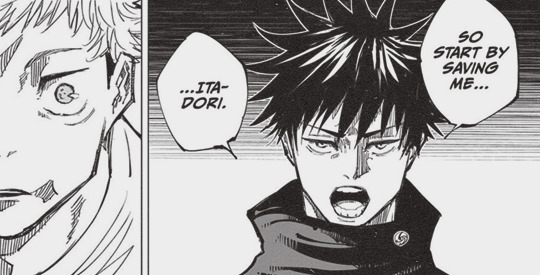
Itadori Yuji x Megumi Fushigoro
The final pair of parallels, but once again the way they contradict each other is on an entirely different matter. Yuji is someone who wants to save everyone indsicriminately no matter who they are. Whereas, Megumi wants to selfishly pick and choose who he gets to save.
This conflict begins from Megumi’s very first action in the manga, choosing to save Yuji after he ate the Sukuna finger, rather than kill him, even if that action puts more people at risk. The relationship between Megumi and Yuji is deeply interwoven into the text of the manga itself. Their actions impact each other’s development.
BECAUSE Megumi chose to save Yuji rather than executing him, Yuta later goes onto let Sukuna rampage in Shibuya. Which made Yuji’s original goal of eating all the fingers, and then sacrificing himself seem a lot less heroic now that the same innocent people he was trying to nobly sacrifice himself to protect have died.
ON THE FLIP SIDE, Megumi is now dealing with a very suicidal Yuji riddled with survival’s guilt, who is leaping at the chance to die for a greater cause. Megumi’s decision to “save people selfishly” is putting him at direct odds with Yuji who he has chosen to save, because Yuji a very selfless person can’t put his life above others, especially the people he’s hurt now.
Yuji has as recently as the latest chapter, offered to die to Angel to let Gojo out of the box because he is just so desperate for SOMETHING to do to make up for letting Sukuna out in Shibuya, while Megumi himself is DESPERATELY trying to keep the people who are still close to him (totalling Yuji, and Tsumiki at this point) safe. Despite the fact that they are such great friends, they still fall into conflict, and that conflict is what makes the ship interesting.
#askspookies#satosugu#yutamaki#itafushi#itadori yuji#megumi fushiguro#yuta okkotsu#maki zenin#satoru gojo#geto suguru
227 notes
·
View notes
Note
I've got one. X-Men hot take:
Theres a Pretty and Power Privilege present in the mutant community that no one seems to talk about. The X-Men are traditionally beautiful and incredibly Powerful, so of course they rise to the upper echelons of Mutant Society, but the non-human presenting Mutants, the ones with non-offensive abilities, The Morlocks? They live in the sewers.
I think MHA explores this idea in a pretty interesting way in the idea of heteromorph discrimination. At least in theory. The execution is shaky.
9 notes
·
View notes